#shapeless album
Explore tagged Tumblr posts
Text


櫻井敦司 | Scans from Shapeless photo-book
Turkey, 1994
32 notes
·
View notes
Text


#the idyll opus#adjy#where june meets july#the cicada's song#idyllposting#i will eventually probably just post this whole album but for now. this one#did you know this song is in 7/4 time?#did you know there's an entire page of the lyric booklet for this song that's just 7s?#A PEN TO DRAW THE SHAPELESS!#A BREATH TO SHAPE THE PEN!#AND WITH YOU WILL BE MY HOME!#WITH YOU I AM PRESENT!#WITH YOU I CAN EXPRESS!#O THOU ART BEAUTIFUL#O MY LOVE - AS TIRZAH!
10 notes
·
View notes
Text
Οι Slow Burning Car είναι ένα ροκ συγκρότημα με έδρα το Los Angeles με τους Troy Spiropoulos (φωνητικά/Μπάσο), Zak St.John (τύμπανα/φωνητικά), Kim Clayborne (φωνητικά), Tommy Marcel (Κιθάρα/φωνητικά), Aaron Kusterer (κιθάρα).
0 notes
Text
ALBUM REVIEW (#39)

shapeless — daine
MY FAVORITE DAINE SONG IS boythots AND THAT SONG IS SO GOOD. CHARLI XCX KEPT LIKE POSTING HER ON HER STORY SO YOU KNOW I GOTTA GIVE IT A LISTEN. THIS ALBUM WAS FINE. I REMEMBER I WAS LISTENING TO IT REALLY LATE AT NIGHT. AND IT GOT A LITTLE HARD TO FINISH IN THE END BC I GOT BORED LOL. IT JUST LIKE INDIE POP MUSIC. IT WAS MID TO BE HONEST AS A PROJECT. IF ANYTHING THE TITLE TRACK WHICH IS ALSO THE OPENING TRACK WAS THE BEST OR AT LEAST THE MOST MEMORABLE FOR ME. LIPS FAKE EYES FAKE TEETH FAKE FACE LIFFTTTTTT I GOT IT ALL NOW I'M SHAPELESSSS. SLAYED.
#shapeless#daine#album#album review#boythots#title track was the best#title track was also opening track#i got it all now i'm shapeless#slayed#mid
0 notes
Text
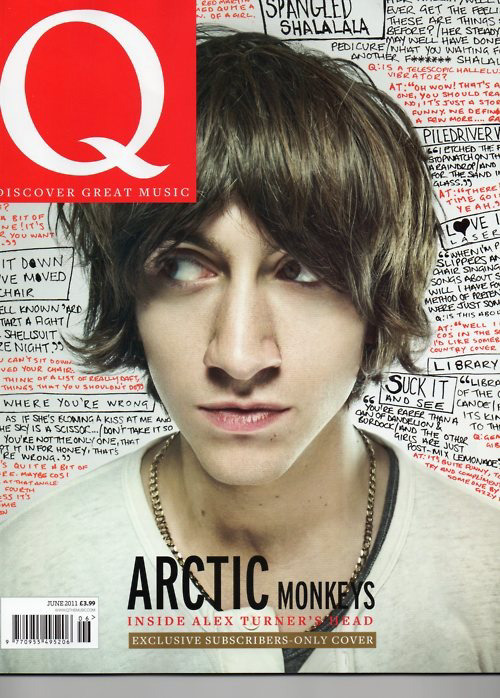

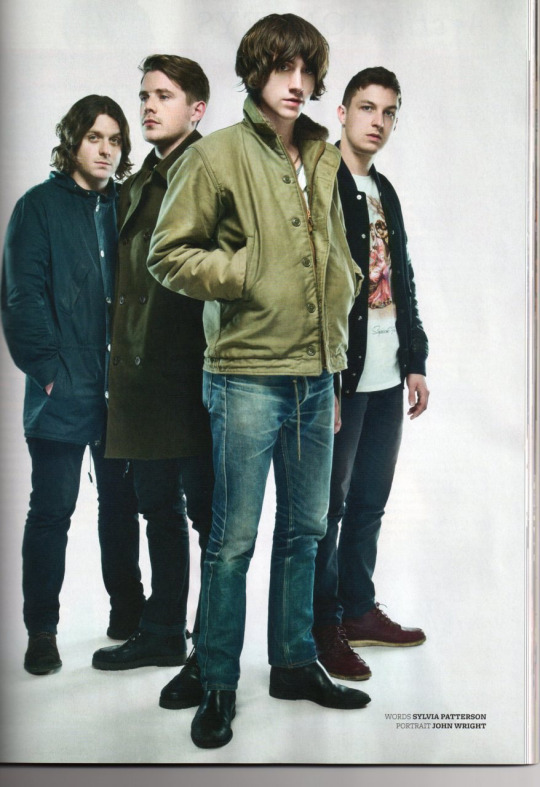
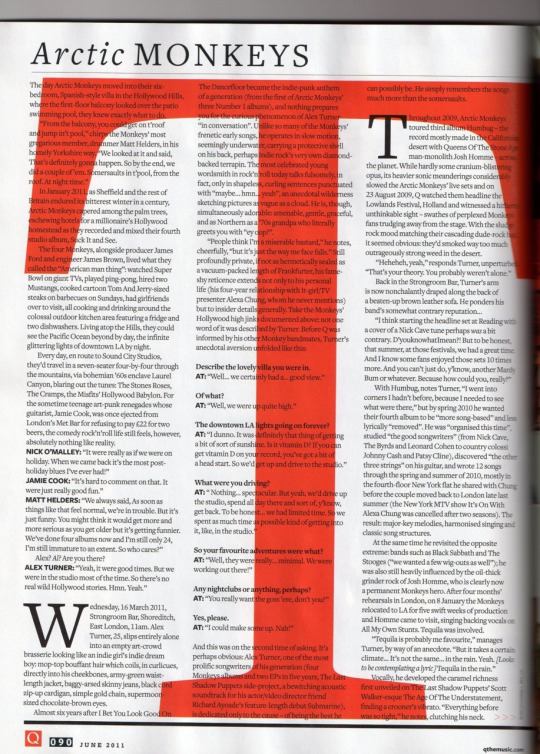

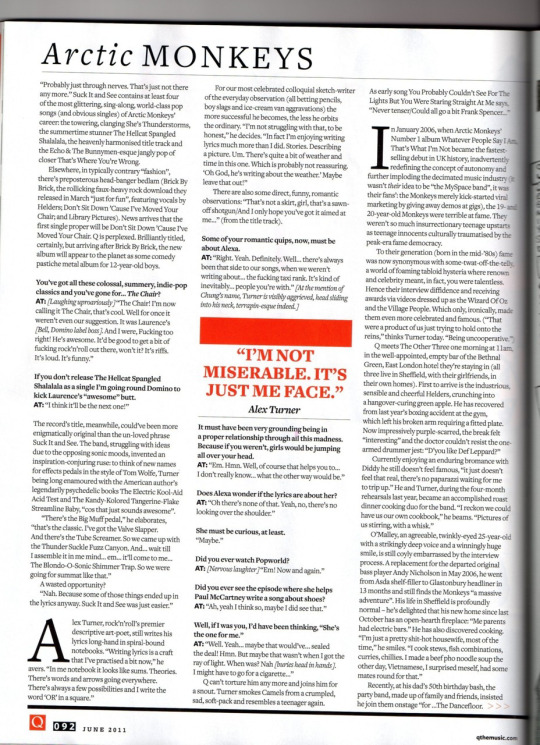


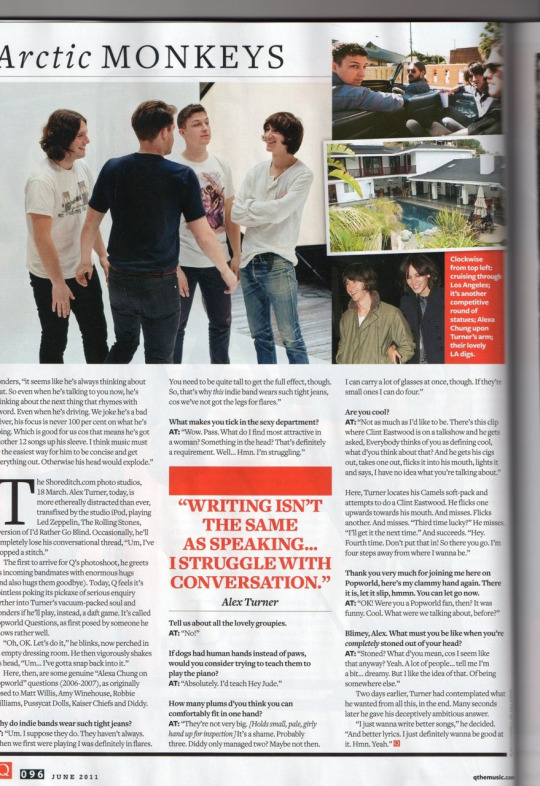
arctic monkeys for q magazine, june 2011 (x) (x)
ARCTIC MONKEYS: Inside Alex Turner's Head
Words Sylvia Patterson Portrait John Wright
The day Arctic Monkeys moved into their six bedroom, Spanish-style villa in the Hollywood Hills, where the first-floor balcony looked over the patio swimming pool, they knew exactly what to do.
"From the balcony, you could get on t'roof and jump in't pool," chirps the Monkeys' most gregarious member, drummer Matt Helders, in his homely Yorkshire way. "We looked at it and said, That's definitely gonna happen. So by the end, we did a couple of 'em. Somersaults in t'pool, from the roof. At night time."
In January 2011, as Sheffield and the rest of Britain endured its bitterest winter in a century, Arctic Monkeys capered among the palm trees, eschewing hotels for a millionaire's Hollywood homestead as they recorded and mixed their fourth studio album, Suck It and See.
The four Monkeys, alongside producer James Ford and engineer James Brown, lived what they called the "American man thing": watched Super Bowl on giant TVs, played ping-pong, hired two Mustangs, cooked cartoon Tom And Jerry-sized steaks on barbecues on Sundays, had girlfriends over to visit, all cooking and drinking around the colossal outdoor kitchen area featuring a fridge and two dishwashers. Living atop the Hills, they could see the Pacific Ocean beyond by day, the infinite glittering lights of downtown LA by night.
Every day, en route to Sound City Studios, they'd travel in a seven-seater four-by-four through the mountains, via bohemian 60s enclave Laurel Canyon, blaring out the tunes: The Stones Roses, The Cramps, the Misfits' Hollywood Babylon. For the sometime teenage art-punk renegades whose guitarist, Jamie Cook, was once ejected from London's Met Bar for refusing to pay €22 for two beers, the comedy rock'n'roll life still feels, however, absolutely nothing like reality.
NICK O'MALLEY: "It were really as if we were on holiday. When we came back it's the most post-holiday blues I've ever had!"
JAMIE COOK: "It's hard to comment on that. It were just really good fun."
MATT HELDERS: "We always said, As soon as things like that feel normal, we're in trouble. But it's just funny. You might think it would get more and more serious as you get older but it's getting funnier. We've done four albums now and I'm still only 24, I'm still immature to an extent. So who cares?"
Alex? Al? Are you there?
ALEX TURNER: "Yeah, it were good times. But we were in the studio most of the time. So there's no real wild Hollywood stories. Hmn. Yeah."
Wednesday, 16 March 2011, Strongroom Bar, Shoreditch, East London, 11am. Alex Turner, 25, slips entirely alone into an empty art-crowd brasserie looking like an indie girl's indie dream boy: mop-top bouffant hair which coils, in curlicues, directly into his cheekbones, army-green waist-length jacket, baggy-arsed skinny jeans, black cord zip-up cardigan, simple gold chain, supermoon sized chocolate-brown eyes.
Almost six years after I Bet You Look Good On The Dancefloor became the indie-punk anthem of a generation (from the first of Arctic Monkeys' three Number 1 albums), and nothing prepares you for the curious phenomenon of Alex Turner "in conversation". Unlike so many of the Monkeys frenetic early songs, he operates in slow motion, seemingly underwater, carrying a protective shell on his back, perhaps indie rock's very own diamond-backed terrapin. The most celebrated young wordsmith in rock'n roll today talks fulsomely, in fact, only in shapeless, curling sentences punctuated with "maybe... hmn.. yeah", an anecdotal wilderness sketching pictures as vague as a cloud. He is, though, simultaneously adorable: amenable, gentle, graceful, and as Northern as a 70s grandpa who literally greets you with "ey oop?".
"People think I'm a miserable bastard," he notes, cheerfully, "but it's just the way me face falls." Still profoundly private, if not as hermetically sealed as a vacuum-packed length of Frankfurter, his fante-shy reticence extends not only to his personal life (his four-year relationship with It-girl/TV presenter Alexa Chung, whom he never mentions) but to insider details generally. Take the Monkeys’ Hollywood high jinks documented above: not one word of it was described by Turner. Before Q was informed by his other Monkey bandmates, Turner’s anecdotal aversion unfolded like this:
Describe the lovely villa you were in. AT: "Well... we certainly had a... good view."
Of what? AT: "Well, we were up quite high."
The downtown LA lights going on forever? AT: "I dunno. It was definitely that thing of getting a bit of sort of sunshine. Is it vitamin D? If you can get vitamin D on your record, you've got a bit of a head start. So we'd get up and drive to the studio."
What were you driving? AT: "Nothing... spectacular. But yeah, we'd drive up the studio, spend all day there and sort of, y know, get back. To be honest... we had limited time. So we spent as much time as possible kind of getting into it, like, in the studio.
So your favourite adventures were what? AT: "Well, they were really… minimal. We were working out there!"
Any nightclubs or anything, perhaps? AT: "You really want the goss 'ere, don't you?"
Yes, please. AT: "I could make some up. Nah!"
And this was on the second time of asking. It's perhaps obvious: Alex Turner, one of the most prolific songwriters of his generation (four Monkeys albums and two EPs in five years, The Last Shadow Puppets side-project, a bewitching acoustic soundtrack for his actor/video director friend Richard Ayoade's feature-length debut Submarine), is dedicated only to the cause – of being the best he can possibly be. He simply remembers the songs much more than the somersaults.
Throughout 2009, Arctic Monkeys toured third album Humbug – the record mostly made in the Californian desert with Queens Of The Stone Age man-monolith Josh Homme – across the planet. While hardly some cranium-blistering opus, its heavier sonic meanderings considerably slowed the Arctic Monkeys' live sets and on 23 August 2009, Q watched them headline the Lowlands Festival, Holland and witnessed a hitherto unthinkable sight – swathes of perplexed Monkeys fans trudging away from the stage. With the sludge rock mood matching their cascading dude-rock hair it seemed obvious: they'd smoked way too much outrageously strong weed in the desert.
"Heheheh, yeah," responds Turner, unperturbed. "That's your theory. You probably weren't alone."
Back in the Strongroom Bar, Turner's arm is now nonchalantly draped along the back of a beaten-up brown leather sofa. He ponders his band's somewhat contrary reputation…
"I think starting the headline set at Reading with a cover of a Nick Cave tune perhaps was a bit contrary. D'youknowhat Imean?! But to be honest, that summer, at those festivals, we had a great time. And I know some fans enjoyed those sets 10 times more. And you can't just do, y’know, another Mardy Bum or whatever. Because how could you, really?"
With Humbug, notes Turner, "I went into corners I hadn't before, because I needed to see what were there," but by spring 2010 he wanted their fourth album to be "more song-based" and less lyrically "removed". He was "organised this time", studied "the good songwriters" (from Nick Cave, The Byrds and Leonard Cohen to country colossi Johnny Cash and Patsy Cline), discovered "the other three strings" on his guitar, and wrote 12 songs through the spring and summer of 2010, mostly in the fourth-floor New York flat he shared with Chung before the couple moved back to London late last summer (the New York MTV show It's On With Alexa Chung was cancelled after two seasons). The result: major-key melodies, harmonised singing and classic song structures.
At the same time he revisited the opposite extreme: bands such as Black Sabbath and The Stooges ("we wanted a few wig-outs as well"); he was also still heavily influenced by the oil-thick grinder rock of Josh Homme, who is clearly now a permanent Monkeys hero. After four months' rehearsals in London, on 8 January the Monkeys relocated to LA for five swift weeks of production and Homme came to visit, singing backing vocals on All My Own Stunts. Tequila was involved.
"Tequila is probably me favourite," manages Turner, by way of an anecdote. "But it takes a certain climate... It's not the same... in the rain. Yeah. [Looks to be contemplating a lyric] Tequila in the rain."
Vocally, he developed the caramel richness first unveiled on The Last Shadow Puppets' Scott Walker-esque The Age Of The Understatement, finding a crooner's vibrato. "Everything before was so tight,” he notes, clutching his neck. "Probably just through nerves. That's just not there any more." Suck It and See contains at least four of the most glittering, sing-along, world-class pop songs (and obvious singles) of Arctic Monkeys' career: the towering, clanging She's Thunderstorms, the summertime stunner The Hellcat Spangled Shalalala, the heavenly harmonised title track and the Echo & The Bunnymen-esque jangly pop of closer That's Where You're Wrong.
Elsewhere, in typically contrary "fashion", there's preposterous head-banger bedlam (Brick By Brick, the rollicking faux-heavy rock download they released in March "just for fun", featuring vocals by Helders; Don't Sit Down 'Cause I've Moved Your Chair, and Library Pictures). News arrives that the first single proper will be Don't Sit Down 'Cause I've Moved Your Chair. Q is perplexed. Brilliantly titled, certainly, but arriving after Brick By Brick, the new album will appear to the planet as some comedy pastiche metal album for 12-year-old boys.
You've got all these colossal, summery, indie-pop classics and you've gone for... The Chair? AT: [Laughing uproariously] "The Chair! I'm now calling it The Chair, that's cool. Well for once it weren't even our suggestion. It was Laurence's (Bell, Domino label boss). And I were, Fucking too right! He's awesome. It'd be good to get a bit of fucking rock'n'roll out there, won't it? It's riffs. It's loud. It's funny."
If you don't release The Hellcat Spangled Shalalala as a single I'm going round Domino to kick Laurence's "awesome" butt. AT: "I think it'll be the next one!"
The record's title, meanwhile, could've been more enigmatically original than the un-loved phrase Suck It and See. The band, struggling with ideas due to the opposing sonic moods, invented an inspiration-conjuring ruse: to think of new names for effects pedals in the style of Tom Wolfe, Turner being long enamoured with the American author's legendarily psychedelic books The Electric Kool-Aid Acid Test and The Kandy-Kolored Tangerine-Flake Streamline Baby, "cos that just sounds awesome".
"There's the Big Muff pedal," he elaborates, "That’s the classic. I've got the Valve Slapper. And there's the Tube Screamer. So we came up with the Thunder Suckle Fuzz Canyon. And… wait till I assemble it in me mind… em… it'll come to me… The Blonde-O-Sonic Shimmer Trap. So we were going for summat like that."
A wasted opportunity?
"Nah. Because some of those things ended up in the lyrics anyway. Suck It and See was just easier."
Alex Turner, rock'n'roll's premier descriptive art-poet, still writes his lyrics long-hand in spiral-bound notebooks. "Writing lyrics is a craft that I've practised a bit now," he avers. "In me notebook it looks like sums. Theories. There's words and arrows going everywhere. There's always a few possibilities and I write the word 'OR' in a square."
For our most celebrated colloquial sketch-writer of the everyday observation (all betting pencils, boy slags and ice-cream van aggravations) the more successful he becomes, the less he orbits the ordinary. "I'm not struggling with that, to be honest," he decides. "In fact I'm enjoying writing lyrics much more than I did. Stories. Describing a picture. Um. There's quite a bit of weather and time in this one. Which is probably not reassuring. 'Oh God, he's writing about the weather.' Maybe leave that out!"
There are also some direct, funny, romantic observations: "That's not a skirt, girl, that's a sawn-off shotgun/And I only hope you've got it aimed at me..." (from the title track).
Some of your romantic quips, now, must be about Alexa. AT: "Right. Yeah. Definitely. Well... there's always been that side to our songs, when we weren't writing about... the fucking taxi rank. It's kind of inevitably... people you're with." [At the mention of Chung's name, Turner is visibly aggrieved, head sliding into his neck, terrapin-esque indeed.]
It must have been very grounding being in a proper relationship through all this madness. Because if you weren't, girls would be jumping all over your head. AT: "Em. Hmn. Well, of course that helps you to... I don't really know.. what the other way would be."
Does Alexa wonder if the lyrics are about her? AT: "Oh there's none of that. Yeah, no, there's no looking over the shoulder."
She must be curious, at least. "Maybe."
Did you ever watch Popworld? AT: [Nervous laughter] "Em! Now and again."
Did you ever see the episode where she helps Paul McCartney write a song about shoes? AT: "Ah, yeah I think so, maybe I did see that."
Well, if I was you, I'd have been thinking, "She's the one for me." AT: "Well. Yeah... maybe that would've... sealed the deal! Hmn. But maybe that wasn't when i got the ray of light. When was? Nah [buries head in hands]. I might have to go for a cigarette..."
Q can't torture him any more and joins him for a snout. Turner smokes Camels from a crumpled, sad, soft-pack and resembles a teenager again. As early song You Probably Couldn't See For The Lights But You Were Staring Straight At Me says, "Never tenser/Could all go a bit Frank Spencer…”
In January 2006, when Arctic Monkeys' Number 1 album Whatever People Say I Am, That's What I'm Not became the fastest-selling debut in UK history, inadvertently redefining the concept of autonomy and further imploding the decimated music industry (& wasn't their idea to be "the MySpace band", it was their fans': the Monkeys merely kick-started viral marketing by giving away demos at gigs), the 19- and 20-year-old Monkeys were terrible at fame. They weren't so much insurrectionary teenage upstarts as teenage innocents culturally traumatised by the peak-era fame democracy.
To their generation (born in the mid-'80s) fame was now synonymous with some-twat-off-the-telly a world of foaming tabloid hysteria where renown and celebrity meant, in fact, you were talentless. Hence their interview diffidence and receiving awards via videos dressed up as the Wizard OfOz and the Village People. Which only, ironically, made them even more celebrated and famous. (“That were a product of us just trying to hold onto the reins," thinks Turner today. "Being uncooperative.")
Q meets The Other Three one morning at 11am, in the well-appointed, empty bar of the Bethnal Green, Bast London hotel they're staying in (all three live in Sheffield, with their girlfriends, in their own homes). First to arrive is the industrious, sensible and cheerful Helders, crunching into a hangover-curing green apple. He has recovered from last year's boxing accident at the gym, which left his broken arm requiring a fitted plate. Now impressively purple-scarred, the break felt "interesting" and the doctor couldn't resist the one-armed drummer jest: "D'you like Def Leppard?"
Currently enjoying an enduring bromance with Diddy, he still doesn't feel famous, "it just doesn't feel that real, there's no paparazzi waiting for me to trip up." He and Turner, during the four-month rehearsals last year, became an accomplished roast dinner cooking duo for the band. "I reckon we could have us our own cookbook," he beams. "Pictures of us stirring, with a whisk."
O'Malley, an agreeable, twinkly-eyed 25-year-old with a strikingly deep voice and a winningly huge smile, is still coyly embarrassed by the interview process. A replacement for the departed original bass player Andy Nicholson in May 2006, he went from Asda shelf-filler to Glastonbury headliner in 13 months and still finds the Monkeys "a massive adventure". His life in Sheffield is profoundly normal – he's delighted that his new home since last October has an open-hearth fireplace: "Me parents had electric bars." He has also discovered cooking. “I’m just a pretty shit-hot housewife, most of the time," he smiles. "I cook stews, fish combinations, curries, chillies. I made a beef pho noodle soup the other day, Vietnamese, I surprised meself, had some mates round for that."
Recently, at his dad's 50th birthday bash, the party band, made up of family and friends, insisted he join them onstage "for ...The Dancefloor. So I were up there [mimes playing bass, all sheepish] and it were the wrong pitch, they didn't know the words or 'owt, going, Makin eyes... er..." He has no extra-curricular musical ambitions. "I'm happy just playing bass," he smiles. "I've never had the skill of doing songs meself. It'd be shit!"
Cook, 25, is still spectacularly embarrassed by the interview process. He perches upright, with a fixed nervous smile, newly shorn of the beard and ponytail he sported in LA: "Rockin' a pone, yeah, because I could get away with it." With his classic preppy haircut and dapper green military coat (from London's swish department store, Liberty), he looks like a handsome '40s film star. (Turner deems Cook "the band heartbreaker" and had a word with him post-LA: "I said to him, Come on, mate, you've got to get that beard shaved off. Get the girls back into us. Shift some posters.")
His life in Sheffield is also profoundly normal. He still plays Sunday League football with his local pub team, The Pack Horse FC (position, left back), remains in his long-term relationship with page-three-model-turned-make-up-artist Katie Downes and "potters about" at home, refusing to describe said home, "cos I'll get burgled".
A tiler by trade, he always vowed, should the Monkeys sign a deal, that he'd throw his trowel in a Sheffield river on his last day of work. "I never did fling me trowel," he confirms. "Probably still in me shed." He's never considered what his band represents to his generation. "I'd go insane thinking about it, I'm pretty good at not thinking about it… Oh God. I'm terrible at this!"
Back in the Strongroom Bar, Alex Turner is cloudily describing his everyday life. "I just keep meself to meself," he confounds. He mostly stays indoors and his perfect night in with Alexa is "watching loads of Sopranos. And doing roast dinners".
No longer spindle-limbed, he attends a gym and has handsomely well-defined arms – "You have to look after yourself."
Suddenly, Crying Lightning from Humbug rumbles over the bar stereo. "Wow. How about that? I was quite happy the other morning cos Brick By Brick were on the round-up goals on Soccer AM. It's still exciting when that happens. It was like Brick By Brick is real."
He spends his days writing music, "listening to records", and recommends Blues Run The Game by doomed '60s minstrel Jackson C Frank ("who's that lass?... Laura Marling, she did a cover recently), a simple, acoustic, deep and regretful stunner about missing someone on the road.
Lyrically, he cites as an example of greatness the Nick Cave B-side Little Empty Boat [from ‘97 single Into My Arms ], a comically sinister paean to a sexual power struggle: "Your knowledge is impressive and your argument is good/But I am the resurrection babe and you're standing on my foot."
"I need a hobby," he suddenly decides. "I'd like to learn another language." Since his mum is a German teacher (his dad teaches music), surely he can speak some German? "I know how to ask somebody if they've had fun at Christmas." Go on, then. "Nah!"
Where Turner's creative gifts stem from remains a contemporary rock'n'roll mystery; he became a fledgling songwriter at 16, after the gift of a guitar at Christmas from his parents. An only child, did his folks, perhaps, foresee artistic greatness? "I doubt it!" he balks. "Cos I didn't. I wasn't... a show kid." Like the others, he doesn't analyse the past, or the future.
"You can't constantly be thinking about what's happened," he reasons, "it's just about getting on with it." The elaborate pinky ring he now constantly wears, however, a silver, gold and ruby metal-goth corker featuring the words DEATH RAMPS is a permanent reminder of he and his best friends’ past. The Death Ramps is not only a Monkeys pseudonym and B-side to Teddy Picker, but a place they used to ride their bikes in Sheffield as kids.
"Up in the woods near where we lived," he nods. "Just little hills. But when you're eight years old they're death ramps." The ring was custom made by a friend of his, who runs top-end rock'n'roll jewellery emporium The Great Frog near London's Carnaby Street. Ask Turner why he thinks the chase between his writing and speaking eloquence is quite so mesmerisingly vast and he attempts a theory.
"Well, writing isn't the same as speaking," he muses. "Not for me. I seem to struggle more and more with... conversation. Talking onstage... I can't do it any more. Hmn. I'll have to work on that."
The ever-helpful Helders has a better theory.
"Since he's been writing songs," he ponders, “It seems like he’s always thinking about that. So even when he’s talking to you now, he’s thinking about the next thing that rhymes with a word. Even when he’s driving. We joke he’s a bad driver, his focus is never 100 per cent on what he’s doing. Which is good for us cos it means he’s got another 12 songs up his sleeve. I think music must be the easiest way for him to be concise and get everything out. Otherwise his head would explode.”
The Shoreditch.com photo studios, 18 March. Alex Turner, today, is more ethereally distracted than ever, transfixed by the studio iPod, playing Led Zeppelin, The Rolling Stones, a version of I’d Rather Go Blind. Occasionally, he’ll completely lose his conversational thread, “Um. I’ve dropped a stitch.”
The first to arrive for Q’s photoshoot, he greets his incoming bandmates with enormous hugs (and also hugs them goodbye). Today, Q feels it’s pointless poking its pickaxe of serious enquiry further into Turner’s vacuum-packed soul and wonders if he’ll play, instead, a daft game. It’s called Popworld Questions, as first posed by someone he knows rather well.
“Oh, OK. Let’s do it,” he blinks, now perched in an empty dressing room. He then vigorously shakes his head, “Um…I’ve gotta snap back into it.”
Here, then, are some genuine “Alexa Chung on Popworld” questions (2006-2007), as originally posed to Matt Willis, Amy Winehouse, Robbie Williams, Pussycat Dolls, Kaiser Chiefs and Diddy.
Why do indie bands wear such tight jeans? AT: “Um. I supposed they do. They haven’t always. When we first were playing I was definitely in flares. You need to be quite tall to get the full effect, though. So, that's why this indie band wears such tight jeans, cos we've not got the legs for flares."
What makes you tick in the sexy department? AT: "Wow. Pass. What do I find most attractive in a woman? Something in the head? That's definitely a requirement. Well... Hmn. I'm struggling."
Tell us about all the lovely groupies. AT: "No!"
If dogs had human hands instead of paws, would you consider trying to teach them to play the piano? AT: "Absolutely. I'd teach Hey Jude."
How many plums d'you think you can comfortably fit in one hand? AT: "They're not very big. [Holds small, pale, girly hand up for inspection] It's a shame. Probably three. Diddy only managed two? Maybe not then. I can carry a lot of glasses at once, though. If they're small ones I can do four."
Are you cool? AT: "Not as much as I'd like to be. There's this clip where Clint Eastwood is on a talkshow and he gets asked, Everybody thinks of you as defining cool, what d'you think about that? And he gets his cigs out, takes one out, flicks it into his mouth, lights it and says, I have no idea what you're talking about."
Here, Turner locates his Camels soft-pack and attempts to do a Clint Eastwood. He flicks one upwards towards his mouth. And misses. Flicks another. And misses. "Third time lucky?" He misses. "I'll get it the next time." And succeeds. "Hey. Fourth time. Don't put that in! So there you go. I'm four steps away from where I wanna be."
Thank you very much for joining me here on Popworld, here's my clammy hand again. There it is, let it slip, hmmn. You can let go now. AT: "OK! Were you a Popworld fan, then? It was funny. Cool. What were we talking about, before?"
Blimey, Alex. What must you be like when you're completely stoned out of your head? AT: "Stoned? What d'you mean, cos I seem like that anyway? Yeah. A lot of people... tell me I'm a bit... dreamy. But I like the idea of that. Of being somewhere else."
Two days earlier, Turner had contemplated what he wanted from all this, in the end. Many seconds later he gave his deceptively ambitious answer.
"I just wanna write better songs," he decided. "And better lyrics. I just definitely wanna be good at it. Hmn. Yeah.”
—
RUFUS BLACK: AKA Matt Helders, on his ongoing bromance with Diddy
Matt Helders has known preposterous rap titan Diddy since they met in Miami in 2008. “He goes, Arctic Monkeys! Then he said summat about a B-side and I was like, He's not lying! I just thought, This is funny, I'm gonna go with this for a while." Last October Diddy texted Helders, suggesting he play drums with his Diddy Dirty Money band on Friday Night With Jonathan Ross, to give his own drummer a day off. “I were bowling with me girifriend at the time. In Sheffield, on a Sunday." On the day of recording, says Helder, "We had a musical director. That were one of the maddest times of my life. Next day Diddy said, Why don't you just stay? Come along with me. So I went everywhere with him." Diddy had "a convoy of cars" and made sure Helders was always in his. "He'd stop his car and go, Where's Matt? You're coming with me! So I'd get in his car. Just me, him, his security, driver." Diddy, by now, had given him a pseudonym - Rufus Black. "He kept saying, I don't wanna fuck up your image. And I'm, I don't think it's gonna do me any harm!" He stayed in Diddy's spectacularly expensive hotel. Some weeks later, Helders almost returned to the Dirty Money drumstool for a gig in Glasgow. "But we were rehearsing in London. I were like, I might come, how are you getting there? And he were like, Jet. Jump on t’jet with me. But I had to stay in Bethnal Green instead.”
Love’s young dream: Diddy (left) with Helders
#arctic monkeys#alex turner#matt helders#nick o'malley#jamie cook#sias era#interviews#q magazine#my image id#bands#this is such a funny interview honestly shfjwjs#self proclaimed housewife nick my beloved......#also why did the interviewer describe alex's hands as small pale and girly HELPME#btw im missing page 93 it's probabky just a photospread but yeah#i managed to find the dead links' images on vk#eye contact#not my scan
292 notes
·
View notes
Text
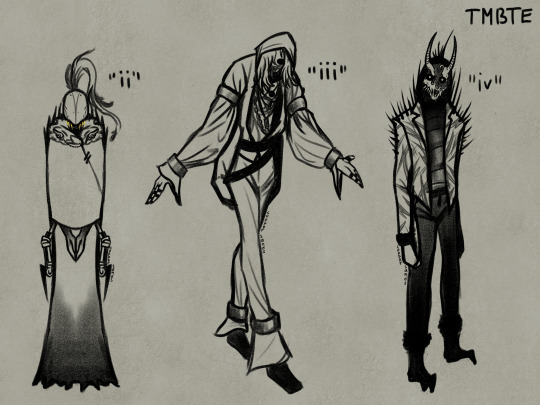
simulacra 3 [take me back to eden]
[sundowning] [tpwbyt]
Sleep's mimic forms of the vessels during the time period of TMBTE, because i can't be normal and start a series from the beginning and not the end.
more info + design breakdowns under the cut:
[obligatory "when talking about the vessels, i'm talking about characters" disclaimer]
background info on the whole idea:
Sleep as a being is shapeless in my mind; more of a concept than a creature. it can manifest as sort of an absence of light in any shape to others, usually to appeal to feeling/emotion. the only "rule" for that is that whatever Sleep tries to appear as cannot look more or less innocent/powerful than Sleep actually is, which usually manifests in two things: the size being different from the thing/person it's imitating, scaled according to power, and/or added features, usually in some way threatening or regal.
one of Sleep's more consistent forms it takes throughout interacting with Vessel is mimicking him, partially to create an illusion of the two being more similar than they actually are and partially because Sleep used to exist as Vessel's shadow when they'd just met. the visual itself has changed through time (you can see what it was like during Sundowning in my Higher artwork), and during TMBTE that visual is pretty much the titular song's character with the most minor tweaks (which is why i didn't draw it separately).
all that made me think about the idea of Sleep mimicking the other vessels just to fuck with Vessel further (to be clear, i am a strong believer that Sleep only interacts with Vessel in any way). so now here are the designs of those mimics during the events of TMBTE, utilizing the album's song characters much like the Vessel mimic. because again, i have to start a series from the end, i guess.
"ii"/ii mimic (song character used: AYROK)
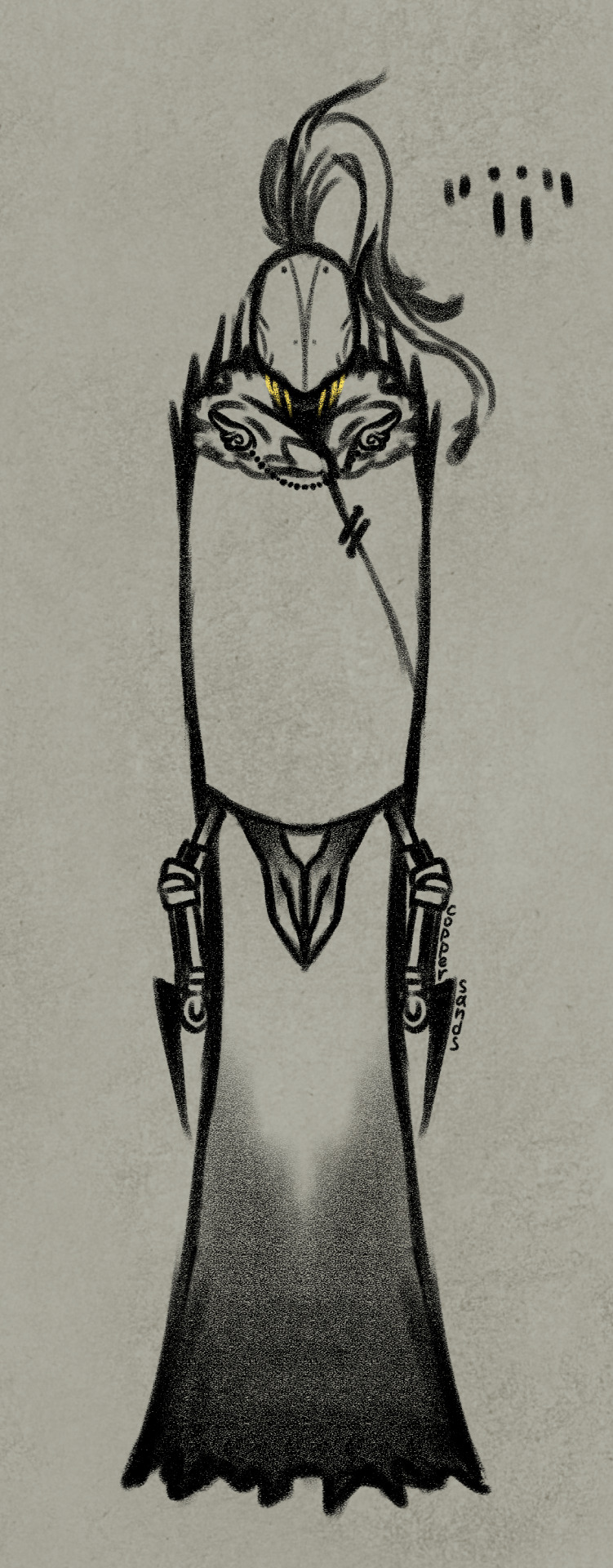
the main idea driving the design of "ii" is the real ii's goal to keep Vessel more or less safe by being by his side in worshipping Sleep, which is the reason he'd decided to become the second vessel in the first place. the choice of AYROK as the character to use in this design is obvious. one of the ideas that stem from that is ii's duty/desire to keep his face hidden for Vessel's sake; only his hands are visible & detailed because that's the only part of him Vessel remembers before either of them became vessels of Sleep and the only part ii has really shown after that. another is ii's timidity in telling Vessel to go against Sleep's will because he fears that no matter how bad it may be, it'll be much worse if Vessel doesn't follow it. that part comes through in the pose - shyly holding his hands together as if they're tied.
"iii"/iii mimic (song character used: Aqua Regia)
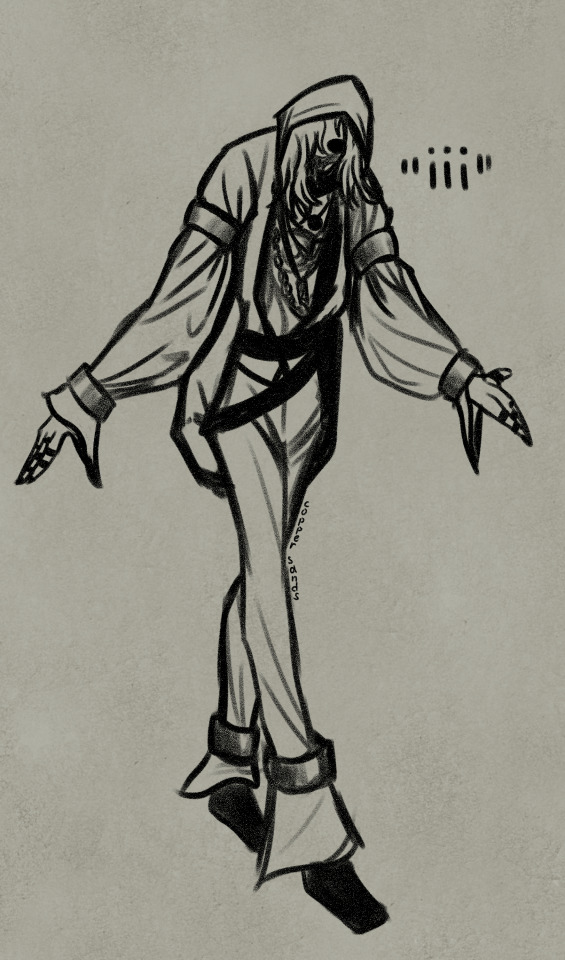
the song character inspo being Aqua Regia is mostly because of the calmer nature of the song and the dynamic duo it makes with Vore, less so the themes of the lyrics. also its visual design. iii mimic's design themes are iii's adoration/borderline obsession with Vessel (wearing Vessel's jewelry and having elements of his robe in his shirt + his own face/mask slowly melting off) and his enagement with worship as an act/aesthetic rather than something more serious (the overabundance of jewelry and accessories; the extra arms; the body language; the cuffs around his arms and legs being decorative and not actually restricting). also the rings on his fingers make a checkered pattern.
"iv"/iv mimic (song character used: Vore)
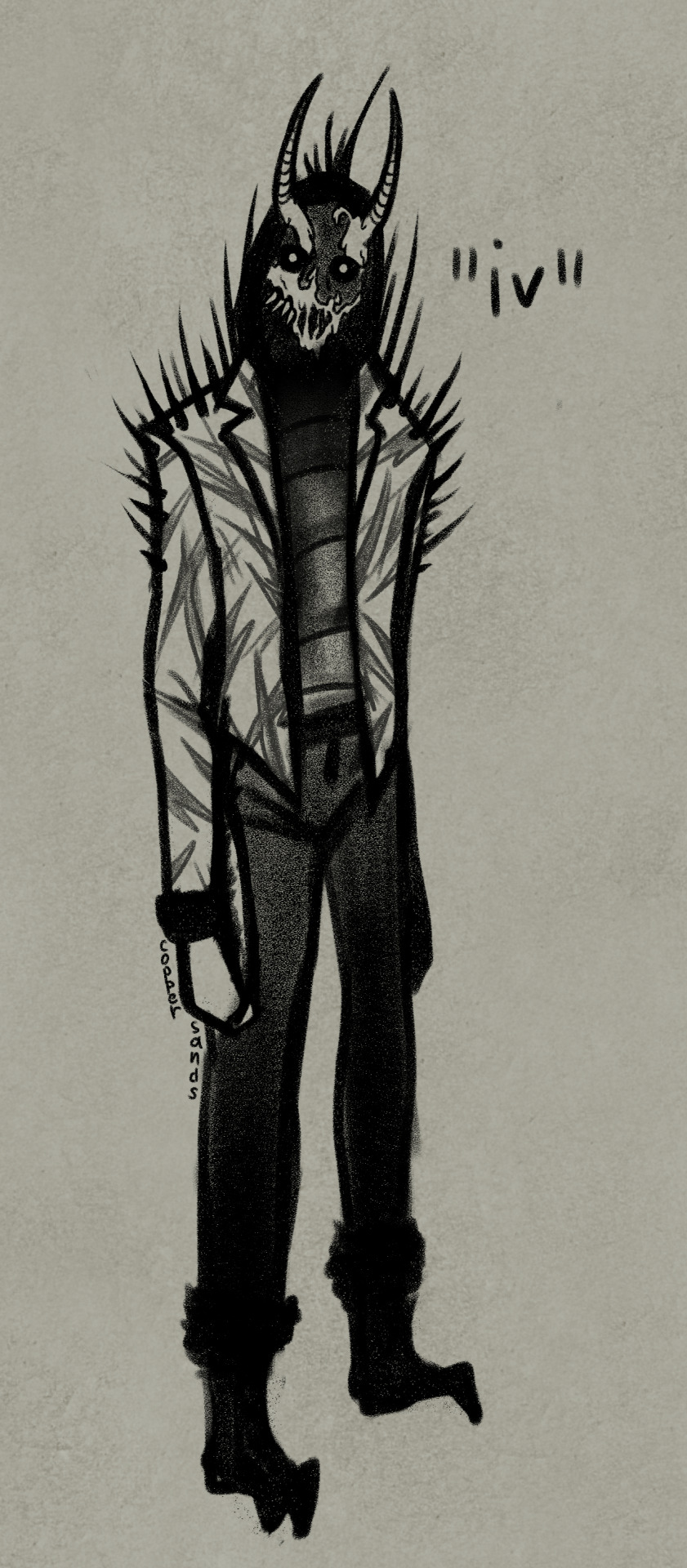
the use of Vore for "iv" is obvious too. song wouldn't be the same without his real life self. the design really just aims to combine iv with the Vore character, but there are two big things here. the simplest one is anger issues, which is why he's So Goddamn Spiky and why his jacket looks like scarred skin rather than painted & customized. the anger mostly shows up in the body language: most of the time "iv" just stares unblinkingly with pure palpable ire in the two glowing dots for eyes, and when he does move it's very stiff and snappy and barely controlled. the other thing is that, simply speaking, the real iv got into this whole mess without knowing the full extent of it and now he's in too deep and kinda losing himself. in the design it's expressed through the human features gradually turning into bug-like, such as the hoodie fading into a segmented millipede-like body and the fucked up mantis hands, and the gold of the original iv's mask melting over the face with the horns being part of it. the spikes protrude from him in a way that makes it difficult to distinguish between jacket decorations and actual parts of his body, but the spines are definitely from his body & allow me to live the dream of iv with a mohawk LMAO
anyway have fun with these go nuts i'll make similar sheets & posts for Sundowning and TPWBYT eventually
#sleep token#sleep token art#sleep token ii#sleep token iii#sleep token iv#sleep token sleep#<- i cannot emphasize enough that ALL OF THESE ARE SLEEP IN DIFFERENT FORMS!!!!!!#IT'S ALL THE SAME BASTARD EXPLOITING VESSEL'S EMOTIONS IN DIFFERENT WAYS#take me back to eden#sleep token tmbte#bygone art#bygone talks#bygone writes#<- that's serious lore screw you /lhj#i was tired when i started writing it and i'm sleep deprived finishing it up#once again have fun if you draw any of these i would be more than thrilled please tag me in that#bygone lore
110 notes
·
View notes
Text
Shapeless シェイプレス by Buck-Tick | 1994 part II
Scans from the BUCK-TICK's Album/Photobook. The photobook included both members and travel photos from their trip to Turkey. (I did not scan all the photos but most of them)
This part has only the photos of the members in order of appearance.
[Esp] Escaneos del CD álbum/fotolibro de BUCK-TICK. El fotolibro incluía fotos de ambos miembros y de su viaje a Turquía. (No escaneé todas las fotos pero sí la mayoría)
Esta parte tiene sólo las fotos de los integrantes en orden de aparición.






























#buck-tick#atsushi sakurai#シェイプレス#j rock#hisashi imai#櫻井敦司#今井寿#星野英彦#樋口豊#90s#ヤガミトール#japanese music#1994#atomomirahija-scans
33 notes
·
View notes
Text
Title: 不定形アバター (Shapeless Avatar)
Arrangement: 平茸
Vocals: 蒼-aoi-
Album: ナチュラル
Circle: Water Color Melody.
Original: Heian Alien
#touhou#touhou project#touhou music#nue houjuu#heian alien#undefined fantastic object#water color melody.#ナチュラル#蒼-aoi-#蒼 aoi#平茸
16 notes
·
View notes
Note
Photos of Lyonyd (Leonid?…) Toptunov? I wouldn’t mind rambling on him, also.
- Rodka
I deliberately saved this ask for last (sort of). As a treat for myself and as a threat for everyone else ♡ And for @ur-favorite-basil-enthusiast since he was also interested in seeing The Collection.
I'll have to split this into a few parts - dreaful, I know! - because I can only add 10 pictures to one post while on mobile =( I'll keep reblogging with additional pictures till I run out of things to share. Subscribe for more insane content in the future and don't forget to click that bell icon to...
Part 1
He had manifested to me in a dream when I first started researching Chernobyl, have I ever mentioned that? Well, he has. Which was truly an anomaly because I almost never have any dreams at all... but about that some other time, perhaps.
I am going to put the pictures of him under the cut so nobody gets jumpscared by my Collection of Five Billion White Guy Pictures. And I'll also include some relevant information! Or as relevant as I can make it, at least.
Just to be clear (and safe): I found all of these out in the wild, on da internet. I am, however, pretty sure that at least the collage of his pics from uni times is from @/toptunovleonid on Instagram. So, just to be very clear: all credit for at least that goes to her.
Semi-chronologically, his pictures go like this:
Ignoring that one picture that is barely visible and out of frame in a few pictures of the photo album it's in, because he looks about 10 there and I feel slightly weird about sharing it specifically.
We're in... Tallinn, middle school number 11!

Second boy from the left in the second picture is him. That is he. He who was 15 then. And a 16 year old Lyonya in the left picture, of course.
From this time, one of his classmates remembers him as follows: At school he was quiet, unnoticeable, very shy. I remember he was always hanging out with younger kids. He was chubby. They'd now say he was a "nerd". Alright, we get it, he was a sweet child... Teen? Both? Or was he like this all his life? Either way, please stop before I die from all that sugar...
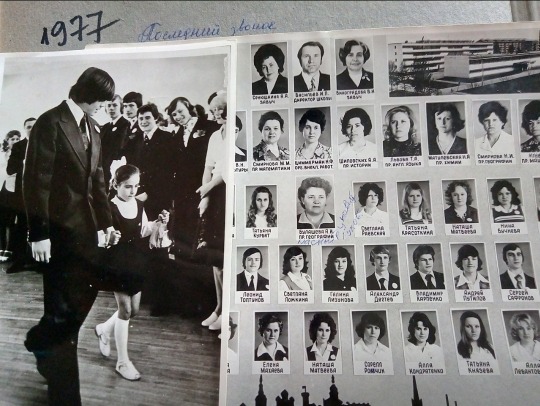
He's (10th grade) the guy leading the little girl (1st grade). His shapeless hair has charmed me. What's his hair routine and will it work on my curls? Mhm, didn't think so. And first in the second row from the bottom in the small pictures, in case you can't recognise his face yet.
As a bonus - his school certificate from the school in Tallinn he attended until graduating in 1977:
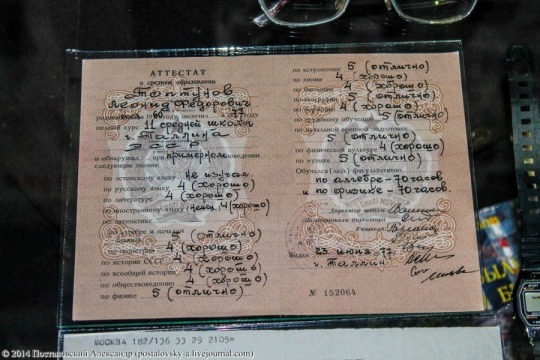
The grades were from 2 (you didn't pass with that one, so that's an F) to 5 (an A, I suppose?). So as you can see, he certainly studied well. What a nerd (affectionately).
Uni territory now! Moscow calling 📞 or, rather, Obninsk and the MEPhI
If you weren't born in any of the USSR countries during The Soviet Times, it'll come as a surprise to you but the students had mandatory... field... work... classes...? if you can call them that. They had them digging potatoes and what not. Nothing screams socialist spirit like making uni students do free labour in the field, I guess?
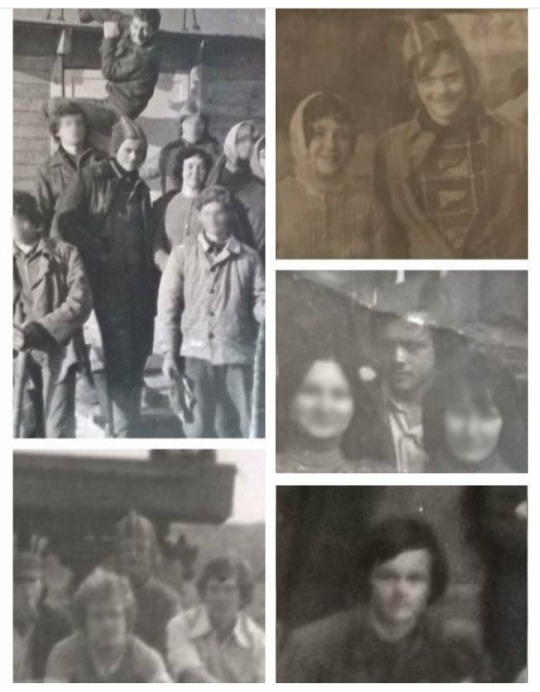
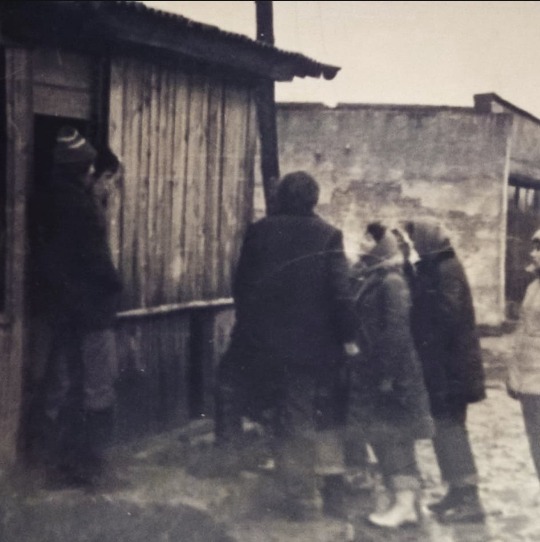
Pictures with his uni girlfriend, how cuuute! (And Sasha Korol hanging from the roof in the background... for reasons unknown)
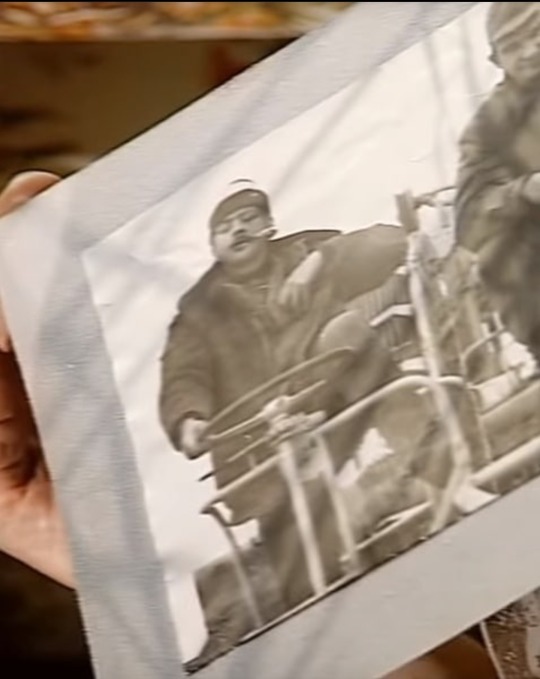
Lyonya pretending to drive a combine harvester. And next to him, obviously, Sasha Korol. When I first saw this picture, I thought he was on some kind of a scaffolding but alas - it's one of those old beasts, like our Bizon. But that's not a Bizon because those had roofs. Nobody here cares for USSR combines talk - not even me - let's move on.

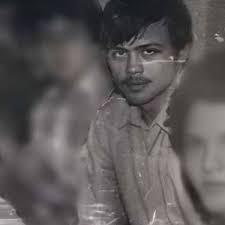
Not too sure when these two are from but they look uni enough to me - probably from the very beginning and sometime closer to the end, judging by his stache doing significantly better...
Mandatory military service because a REAL MAN in the USSR needed to know how to shoot a gun, obviously. Even when that meant military service interrupted your uni for a short while. I say that as if no other countries before or after had mandatory army time... don't question it, I'm doing a bit.
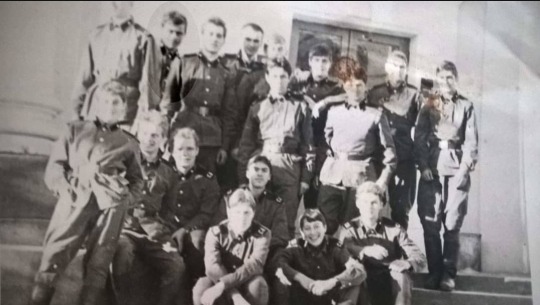

Lyonya is second in top row in the picture on the left and third from the left in the top row in the other pic. Korol is there, too, he's fourth from the left in the top row in the first picture and second from the right in the bottom row in the other picture.
#I'll leave my particularly unhinged comments for later pictures. just you wait. wait and quiver in fear#leonid toptunov#file: special interest: chernobyl#chernobyl#file: ask!#asker: rodka
29 notes
·
View notes
Text
Song of the Day (Day # 548)
🌀 🌀 🌀
youtube
Song: Bardo
Artist: Trauma Ray
Album: Chameleon
Year Released: 2024
https://traumaray.bandcamp.com/
Lyrics:
Shallow I’m wading Too slow No saving Your ghost Is fading Don’t go
Without me
Stay here Won’t you stay So near Won’t you wait
Shapeless It’s too soon Silence
Without you
Stay here Won’t you stay So near Won’t you wait Won’t you stay here Won’t you stay Won’t you stay here Won’t you stay
2 notes
·
View notes
Text
The Elton Family Album: Volume IX



Marmaduke is going places, and the Simoleans are rolling in! (But quite why he's wearing that horrible, shiny, shapeless Maxis suit after his promotions, I don't know, as I have a default replacement - it just doesn't seem to show up for the career outfit?)

Older brother Ambrose is still more interested in partying...

...and romantic opportunities.


And he still doesn't care about his eccentrically-dressed, noise-sensitive neighbours.

But he gets a lucky break in his career too. (And the eagle-eyed might spot that he has developed some rather more serious intentions towards Cassandra, which he has yet to act on, perhaps knowing that she's not all that well-disposed towards matrimony at the moment...)

With his career plans progressing very nicely indeed, Marmaduke decides to be more proactive about his own love life. Through his brother, he's been introduced to Henrietta, and he decides to ask her out on a date, to get to know her better on neutral territory.

For a fun, low-pressure outing, they head to 'Little Buddha Karaoke and Ramen', in Sanditon's Takemizu Town.

The noodle bar seems to be catering for cats - or maybe not, as this one is struggling to get served!

It's Dolly! Catherine's runaway! Well, it's good to see that she's still around, but she doesn't seem to have any intention of returning home.

After a kerbside back rub...

...it's time to make some dopey faces while singing a duet.


Back home, it's clear to both of them that something special is happening here.

Ambrose can sense it too. Since he doesn't have any serious designs on Henrietta himself, he decides to give them both some space, and moves out of the rented apartment. But where is he headed to next?
#sims 2#gameplay#build mode#merybury#sanditon#elton family#ambrose elton#marmaduke elton#cassandra crawford#henrietta wentworth#dolly steele#catherine steele
13 notes
·
View notes
Text
I took some time to scan the Shapeless | Buck-Tick (1994) photobook I received this month, bought it from a seller in Japan, it's second hand of course but it's in beautiful condition.
I want to share my favourite photos from this book. I've talked about this here before, how some photos transport me to a different mood even to the point of connecting the image with a story, I feel these pictures apply to this concept of pseudo-nostalgia so to speak, here's my "definition":

The photobook was shot in Turkey and released in 1994. The photo album includes the members, other people and random photos from the trip that match very nicely with the tone of the mixes in my opinion.

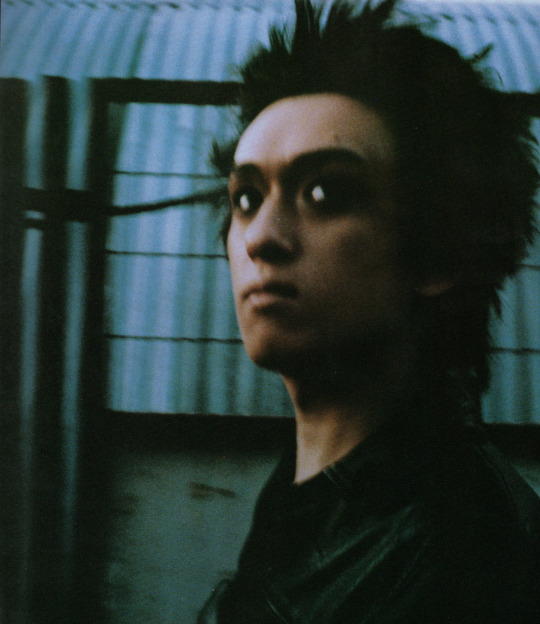

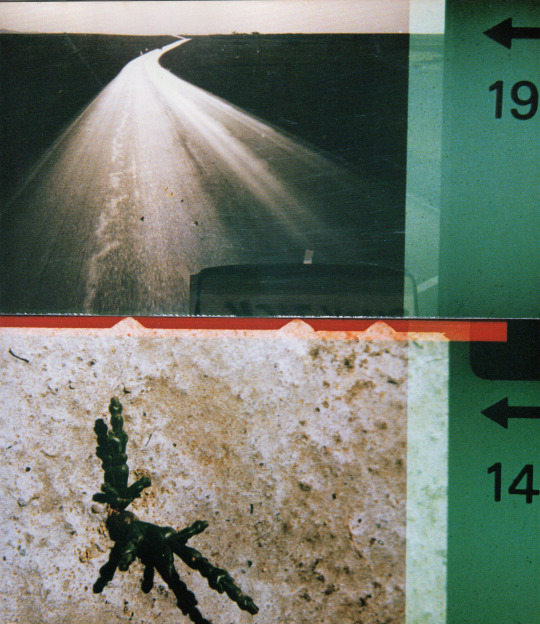

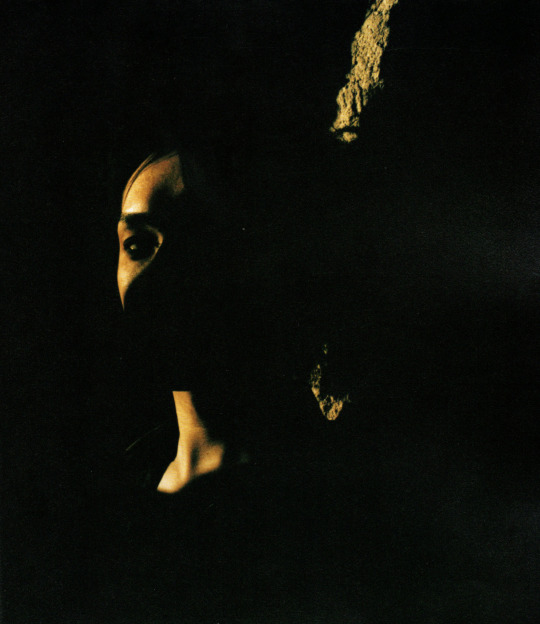
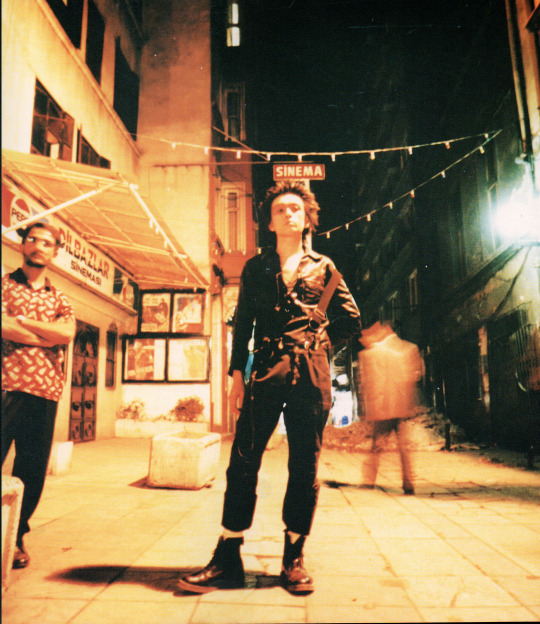
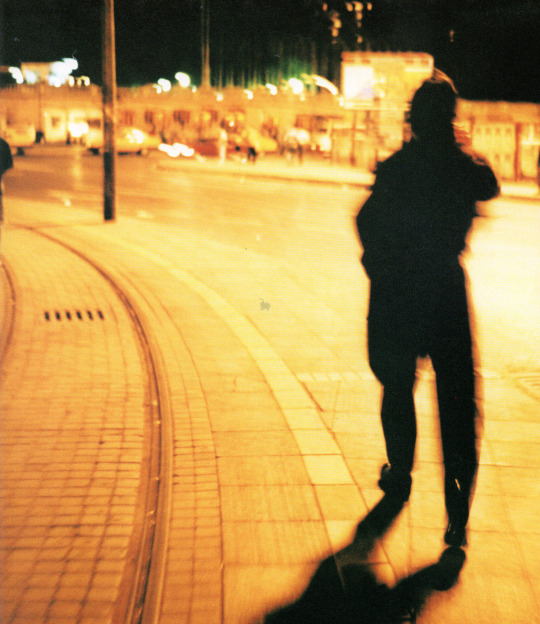
#buck tick#atsushi sakurai#hisashi imai#yutaka higuchi#hidehiko hoshino#toll yagami#shapeless album#1994#mixes#Spotify#blog
25 notes
·
View notes
Text
Ivo Perelman and Nate Wooley — Polarity 3 (Burning Ambulance)

Polarity 3 is hard to parse. Saxophonist Ivo Perelman and trumpeter Nate Wooley have recorded two previous albums as a duo, both pushing at the boundaries of free jazz and improvisation.
Their latest collaboration, Polarity 3, runs just over an hour and offers ten different performances. There’s no songbook, no standards, not even a set of chord changes tying them together. These performances vary in length from just a couple minutes to a ten-minute improvisation that closes the record.
The record showcases the chemistry they’ve developed as a duo over their past records. They bounce phrases and ideas off each other, constantly pushing each other in new directions. Sometimes they come together to play in sync before spinning off in their own directions. It’s like a dance, though one without a lot of rules.
“One” opens with both artists playing long notes but soon they switch to short, wavelike patterns and circling around each other, eventually moving up and down the scale. Over eight minutes, they feel each other out: they take turns, then slowly start to play at the same time and eventually find some common ground in the last third of the track.
For the first part of the record, they move slowly, as if trying to set a tone for the evening: “Two” is a mood piece with its long, drifting notes. In “Three,” they experiment with the ranges of their instruments, quickly building up the pace and energy. The track ends with both blowing harsh bursts of sound, like a tape reel running into a burst of static.
Polarity 3 starts to come together on “Four” as they work in tandem, sometimes playing a base for the other, sometimes moving around the same ideas. When Wooley plays a rising phrase of notes, Perelman follows with one of his own, or vice versa. By the end of the performance, Wooley is playing low, buzzing notes and Perelman’s getting a nice, full-throated tone out of his tenor sax.
“Six” is another standout. They start with quick, darting movements around some high notes and eventually their playing gives the impression of two musical lines that are twisting and bending around each other, like ivy growing along a trellis. Soon the notes take on a harsher edge, with Wooley’s starting to buzz and Perelman's getting a rough, airy tone. But eventually they work back to common ground and play some bright notes in harmony.
Polarity 3 is full of moments like that and it’s tempting to say it’s like one is setting puzzles for the other to find their way out of. But that doesn’t seem quite right — this is not a partnership that feels combative or at odds. It’s more like two people working together on putting together a puzzle or shaping a piece of art. It feels collaborative in the sense that each is building on what the other’s doing, of them trying to find a shape for ideas running through their mind.
Sometimes shapelessness gives way to a feeling of sparseness and open space. The horns echo and the brief moments of silence fill the room. At others, the similarity of their two voices left me wishing they mixed it up somewhat, for instance, with Perelman switching to a different kind of horn. But then there are moments where Wooley changes the timbre of his trumpet or where Perelman works right at the lower registers of his sax, giving things a boost of color. On “Eight” he uses a mute and gives his trumpet a decidedly Miles-like tone, even if he’s playing in a radically different style than Miles ever did.
Free jazz records like this have the potential to come off as self-indulgent, with the feeling of the musicians noodling endlessly. Thankfully that’s not the case here: these two engage with each other enough that the music never feels like it’s settling down. It might be a little hard to grasp for someone new to either one, but the kind of listener who’s familiar with any of Perelman’s previous free records (Tuning Forks, The Whisperers) will like what they find here.
Roz Milner
#ivo perelman#nate wooley#polarity 3#burning ambulance#roz milner#albumreview#dusted magazine#jazz#free jazz#improvisation
6 notes
·
View notes
Text

Tracklist:
(How To: Work A Room) • Bone Bag • Farrington Pond • Blue Age • (How To: Initiate Conversation) • Comes As Relief • Some Bright Lights • A Gash On The Cheek • YDS2M • (How To: Appear More Confident) • Go To Sleep Kimberly • Stockholm Syndrome • (How To: Make an Exit) • Shapeless Place
Spotify ♪ Youtube
11 notes
·
View notes
Text
Untitled piece on worried music (or some shit)
This piece has been floating around, shapeless and structureless, for the better part of four months now. I don't particulary care to give it any sort of unifying theme, or to put it into comparison with autobiography as I usually do. This will have to stand on its own as an ostensibly gratuitous exploration of various levels of preoccupation in music that I like. This being said, hope you enjoy the dive and you find something worthwhile to listen to. For those of you who hoped to read more about my very boring personal life, well, it's this way or the highway this time. I'm really bad at this, aren't I?…
Orchestral Manoeuvres in the Dark (don't worry, I will no longer subject you to this long ass name and will stick to the conventional acronym) live in this weird limbo where they might be among the longest-running acts to originate from the late '70s and yet at the same time are by and large considered by most a one-hit wonder. And to be fair, Enola Gay could very easily be the single best synthpop track ever recorded, thereby rendering other tracks from the same genre functionally useless to people who do not care about synthpop. I, however, care a lot about synthpop. But I also care a lot about a different, very underrated aspect of synthpop: its paranoia.
youtube
There's a really cool piece by Mark Sabatini on the Red Wedge magazine. The piece opens with a picture of peroxide-hair David Sylvian sitting in front of a Prophet-5 and is dedicated to Scott Walker and Mark Hollis, so it's basically just tailor-made for me right out of the gate. More importantly, however, it underlines the important relationship between some of the earliest bands in British synthpop and the concept of eerie in the Mark Fisher sense of the word, or some kind of uncertainty with regards to the future. The late 1970s sit at the cusp of a special time in contemporary history, not just because of what Sabatini notes, i.e. the passing of the torch between two decades that came to symbolize two completely different visions of the world (political, social, economic, cultural). The early Eighties would turn out to be some of the most tense years in the entire Cold War. A record like This Heat's Deceit is a direct byproduct of a terrifying climate of impending doom, faced with a dry sarcasm only the sense of rushing to an early grave could grant. In the Yellow Eyes post I also added a number of other examples, none of which strictly relevant to this exact post. One would think that OMD's preoccupation with being, at once, "ABBA and Karlheinz Stockhausen" would force them to a more sideways approach to these same feelings. To an extent, this is true, in that they very rarely discuss current-day topics in a direct way. I am specifically writing about, of course, Enola Gay, but take for instance a track like Telegraph. I remember sending it to Dog a while back and their reaction was quite priceless. Not only did they define it as "whimsical" and "faelike", wow!, but they also very acutely pointed out "something sinister about it just under the surface … it feels subtly dangerous".
youtube
This is technically true for the entire Dazzle Ships album. From the first moment we are in Prague, a weird place to be in the year 1983. A sampled trumpet fanfare loops around, a voice speaking in Czech, that same fanfare theme rearranged for a full orchestra. Then it hits you with a song titled, I shit you not, Genetic Engineering. The little children, the future in our hands, feel like more of a menace than they do a promise. They are to be controlled. International tackles rampant nationalism. Radio Waves echoes Kraftwerk and ties back into Telegraph. Of All the Things We've Made, a heartwrenching controlled melodic burst sounding like it could fit straight into the Disco Elysium soundtrack, reflects on the rift between Cold War superpowers with touching longing for world peace. And yet the most representative track of the whole lot might be Time Zones. A mess of jambled radio hourly signals: around the world in barely thirty seconds, codified conventional human behaviour presenting itself in the barest possible function, the capability to tell time. I've always been terrified of radio hourly signals. I remember car trips in the night, the mechanical nightingale chirping before the five boops right before the hour ended. I remember silent screens with sudden noises and an impersonal voice telling the time. So sterile it felt inexorable, the same way doom is.
youtube
youtube
On the other hand, this barely controlled element of quiet terror – a shift of the mask revealing an inhuman grin? – can at some point just burst into a more direct feverish sense of impending death. This is where a band like Sunrise Patriot Motion comes in. According to this incredible interview with Invisible Oranges, not only is every SPM release a piece in an ongoing story (so far there are two, so you're still in time to get in on the action before it gets too complicated), but Black Fellflower Stream – record number one – was actually itself the product of a driving obsession. In the words of Will Skarstad himself:
"For the first time ever Yellow Eyes was all over the place, but with this, we were like, twice a week, every week getting together. We got into this crazy routine, got obsessed, let’s finish this record. We were just so psyched about it."
Yes, the Skarstad brothers are once again involved. Not that much of a surprise, to be completely fair to you. Their guitar work with Yellow Eyes somehow manages to transcend the usual arrangement tactics of black metal, sounding less and less like cookie-cutter true-Norwegian imitators by the millisecond. While a record like Immersion Trench Reverie perfectly illustrates that, in SPM that same reality-warping harmony is bent in the direction of a post-punk-tinged beast, retaining however the powerful drive and pulse of metal. The brothers, ever so self-conscious, call it their "nu metal" project. I'm not inherently opposed to the idea: Deftones's Chino Moreno is notoriously a massive Japan and Duran Duran fan, Korn's Jonathan Davis got into makeup because of the Cure's Robert Smith. Where the fundamental difference with classic nu metal comes in is probably in the themes. Specifically, Black Fellflower Stream details the psychological journey undergone by a man who, in a religious stupor, comes to believe that he can dig a hole deep enough to find oil. Military symbolism, Catholic imagery relating to mystical ecstasy, incoherent autobiographical babbling, all tied together with the progressively clearer and unavoidable understanding (as per My Father Took Me Hunting in the Snow's liner notes) "that he is the sun, and, as the day ends, so will he."
Musically, in these two records, anything goes. Dungeon synth-inspired fake-ass FM keyboard preset sounds leave space to chugging heavy rhythm guitars, interspersed with yelled (more so than screamed) vocals courtesy of Andy Chugg and incredibly imaginative sampling and sound layering. The musical landscape painted by all of these elements, brought together in such a way that it feels miraculous for them to actually coalesce, is one of absolute military terror, where personal life and one's past are exploded into shrapnel, transform a delusional pretense into a mission of quasi-religious penance. One certainly wonders how long the experiment can go and how it can evolve. But I, for one, am glad that I got to hear these two records, and can't wait for any new music coming our way. Even if it means delving into horrifying visions of petrol war.
But what happens when this state of worry, paranoia almost, comes to essentially burn a hole into reality itself, detaching from average parameters of direction, time, weight, emotion? My guess is you get something close to the latest Ben Frost record. Not one to be intimidated by loud noises, Frost's body of work evolved from forlorn, cinematic guitar to progressively more Dangerous, noisy and aggressive territory. By the time A U R O R A hit it was hard to see where the project would go next. I would argue this was true for Frost as well: the vulgata around The Centre Cannot Hold (and its related EPs and singles) seems to be that it was a bit out of focus, speaking euphemistically. I don't disagree, regardless of my affection towards Threshold of Faith specifically. But Frost's arrival to a deviant, eldritch post-metal form sounds like it holds the key to a new fascinating approach.
The idea of "blending metal and electronica" will bring some of my older followers back to the Prodigy, or Nine Inch Nails, or Godflesh, or even Atari Teenage Riot if we want to force it a bit. On the other hand, some of my slightly less old followers will probably be catapulted into horrible traumatic nightmares of generic 2010-era metalcore bands incorporating keyboardists, brostep mid-range drilling FM modulation, overcompressed guitars and autotuned vocals. I'm proud and happy to report that, if anything, Scope Neglect swings more in the first direction than it does in the other one, but it's not a matter of sound as much as it is a matter of approach. Greg Kubacki (Car Bomb) provides absolutely crushing guitar work – not to mention Liam Andrews (My Disco) and his devastating bass guitar – sounding very much like abstracted takes on his main band's tracks. Yet the guitars sound heavily compressed, laser-focused on filling the mids in a very djenty way (look mom, I said djent in 2024, do I get an award for this?). This is, by design, as modern metal as it gets: and yet it sounds nowhere near as cauterized.
Not just because of the arrangements. And granted, the arrangements go a really long way to achieve the core idea of the record; but Frost's processing of the sounds turn Kubacki's cerebral bursts themselves into inhabitable, inhospitable spaces – bedrock for mind-crushingly heavy atmospherics – which are only then left to be filled with the listener's own imagination and a minimal number of sparse effects and austere melodies. Much in the same way as Autechre (and we're back!), this record comes to build the very spaces it describes, setting aside cinematic tactics – except, maybe, on closer Unreal in the Eyes of the Dead – in favour of an architecture of impossible terrors and, well, a worry and paranoia so imposing and totalising that it transcends discernible form, solid structure, anything but the (very few) bare and basic sonic referents it alludes to.
#musica#music#schismusic#schism writing#long form content#orchestral manoeuvres in the dark#omd#sunrise patriot motion#ben frost#dazzle ships#black fellflower stream#my father took me hunting in the snow#scope neglect#paranoia#worry#Youtube#Bandcamp
3 notes
·
View notes
Text
The Rebel: Patti Smith
--I bring Tim Buckley's unreleased demo of the old folk tune ‘Wayfaring Stranger’ for Patti, and she talks about how the singer/songwriter was a favourite of Robert Mapplethorpe’s back in the early Brooklyn days, and chuckles when she recalls how she and her first partner in artistic crime would neck like high school kids to the Goodbye And Hello album. She was delighted when Jeff Buckley stopped by the recording sessions and added a high, ghostly vocal part to ‘Beneath The Southern Cross’, and even more delighted when he raced home and returned to the studio with an essrage, an Egyptian instrument he used to texture the track ‘Fireflies’.--
youtube
---
Ben Edmonds, MOJO, August 1996
To R.E.M.’s Michael Stipe, she is "one of the premier artists of my lifetime – I’ve blindly stolen from her for years." To Bob Dylan, she is "still the best, you know." She is one of rock ‘n’ roll’s true originals, and on her return to the fray after eight years of joy and tragedy lived out of the public eye, Patti Smith grants Ben Edmonds the most revealing interview of her career.
PATTI SMITH IS IN FULL SWAGGER, WORKING THE ROXY Theatre stage in LA with relaxed authority. She takes the stage alone, wearing a shapeless warm-up jacket with hood tightly framing her face, to deliver a fiery reading of ‘Piss Factory’. With each succeeding song she adds band members until her musical complement is complete. Left-hand man Lenny Kaye and drummer Jay Dee Daugherty are Patti Smith Group confederates, while bassist Tony Shanahan has played with Kaye and John Cale (and backed Patti on some solo dates last autumn). This core trio is augmented by Patti’s 23-year-old poetry protege Oliver Ray on rhythm guitar and — seated stage left behind impenetrable shades and cradling his guitar like some old CBGB's bluesman — Tom Verlaine.
Smith has a couple of wild cards up her sleeve as well. She introduces Bob Neuwirth as "the person who encouraged me to sing and gave me my first start," after the legendary personage – Bob Dylan road companion, Jim Morrison babysitter, painter, filmmaker, composer of ‘Mercedes Benz’ for Janis Joplin – has sung a typically wonderful song called ‘I Don't Think Of Her’. "Bobby has a new CD out [Look Up on Watermelon Records] on which I appear," Patti announces. "It's available almost nowhere."
Her son Jackson, 13, appears plugged in and joins the troupe for a romp through – are you ready? – ‘Smoke On The Water’. Jack and guitar stand nose to nose with the amp, noodling noisily as Lenny Kaye sings Deep Purple's stirring lament for the tragic death by fire of recording equipment. Mom makes the most of her vocal cameo, belting out "Fire in the sky-eee" in the most godawful screech you've ever heard. It's a small glimpse of what the future might have held had Patti chosen to become the singer of Blue Oyster Cult (for whom she wrote songs) instead of setting off on her crusade to save the soul of rock'n'roll with The Patti Smith Group.
The band has a homemade, slightly ragtag quality that reminds this audience member of nothing so much as the earliest Patti Smith Group when it consisted of Patti, Lenny and Richard Sohl. That trio "toured" California in 1974 to "promote" ‘Piss Factory’, and you felt like you were watching something invent itself right before your eves. This mini "tour" follows almost exactly the same path, and once again you feel like you're watching something in the exhilarating process of becoming.
They attack a fair number of familiar songs – ‘Ghost Dance’, ‘Rock'N'Roll Nigger’, ‘Dancing Barefoot’ (although, curiously, nothing from Dream Of Life) – with gusto. The 10 shows opening for Bob Dylan last winter seem to have jump-started this aggregation's chemistry, and they're now also capable of moments of transcendence that rival anything Patti's bands have attained in the past. ‘About A Boy’, her meditation on the loss of Kurt Cobain, has grown from humble acoustic beginnings into an oceanic noisefield than tonight is staggering. And their ‘Wicked Messenger’ ranks with the great rock rearrangements of Dylan songs. It's a treat that such a thing remains possible in 1996.
The small acoustic shows and guest spots she's done sporadically over the past year have been tentative in tone and occasionally awkward. She is not – nor does she have the slightest inclination to be – the punk tornado who ripped through this room 20 years ago, when the Roxy was LA's premier showcase club, hosting legendary engagements by Neil Young, Bruce Springsteen and Bob Marley, and live recordings by Frank Zappa, Talking Heads, Warren Zevon and others. But she has certainly regained every bit of the belief that the space is hers to command.
The sold-out house is evenly divided between the older soldiers who served in the rock revolution Patti Smith heralded in the early '70s and those who wish they could have been there, having heard their own heroes like Michael Stipe say that were it not for Patti Smith he wouldn't exist. The R.E.M. singer has been all over MTV News this week, quoted as saying that Patti's show at the Wiltern Theatre a few days earlier had been not simply the greatest concert he'd ever seen, but one of the greatest emotional experiences of his life. *
THE PATTI SMITH RESUME: ARRIVED IN NEW YORK FROM New Jersey in 1967 and wrote herself a new identity in concert with photographer Robert Mapplethorpe; wrote plays like Cowboy Mouth with Pulitzer Prize winner Sam Shepard one line at a time, pushing a battered typewriter back and forth across a Chelsea Hotel tabletop in a game of attitude chess; published small press volumes of hallucinogenic verse inhabited by James Joyce, Johnny Ace, Jesus Christ, Harry Houdini, Joan of Arc, James Brown, Georgia O'Keefe, the Paragons and the Jesters, Picasso and Rimbaud and Bob Dylan's dog; wrote poems, profiles and record review reveries for Creem and Rolling Stone; put her big ideas into embryonic practice at her Rock'N'Rimbaud readings accompanied by guitarist Lenny Kaye at St Mark's Church, New York's new poetry nirvana; released ‘Piss Factory’ b/w ‘Hey Joe’ in 1974 on their own Mer Records, now regarded as one of the first shots fired in the punk/indie revolt (though at the time it was a shot barely heard in the next block); released in 1975 a debut album Horses, a parable in spoken word and song for the declaration of self that adolescents itchy to slip their skins will probably respond to for generations to come; sounded a clarion call with her amped-to-the-teeth Patti Smith Group that has been answered only in part by punk rockers, alterna-nerds and riot grrrls; fell from a Tampa, Florida stage in 1977 to a concrete floor 14 feet below, breaking her neck; came out of traction and back into action with ‘Because The Night’, a hit single co-written with Bruce Springsteen, yet always gave equal time to noisy improvisational epics like ‘Radio Ethiopia’ that were unplayable on any radio format (and guaranteed to scare the living piss out of anyone attracted by her Brucie ballad); announced her retirement from public life in the shadow of her biggest-selling album (Wave); and immediately following her biggest concert ever (85,000 in an Italian football stadium on September 10, 1979) quietly married former MC5 guitarist Fred 'Sonic' Smith in 1980, and moved to an unassuming Detroit suburb to raise a family. In the next decade she raised her head above the parapet only once, with her 1988 album Dream Of Life.
Since 1990, Patti has suffered the loss of four of her closest comrades. Her best friend Robert Mapplethorpe was claimed by AIDS. Her piano player (and, after Lenny Kaye, longest-serving musical ally) Richard Sohl succumbed to heart failure. Then in late '94 her husband, soulmate, and hero of so many of her best songs (‘Because The Night’, ‘Frederick’, ‘Dream Of Life’), Fred 'Sonic' Smith, suddenly passed away, a shock compounded by the death of her brother and crew manager Todd Smith only a month later.
The release of a new album, Gone Again, and a limited return to live performance is part of a plan she and Fred had mapped out before his untimely passing. Yet there's no denying that these activities have now become, at least in part, a memorial to all her fallen comrades. This mission was launched in earnest last December when, at the personal invitation of Bob Dylan, she opened 10 of his shows on the East Coast, a pairing he dubbed The Paradise Lost Tour.
"A lot of girls have come along since Patti started," Dylan told a Boston audience the first of many times they duetted on his song ‘Dark Eyes’. "But Patti's still the best, you know." Then he kissed her. *
DRIVING TO PATTI'S HOUSE, I WAS THINKING ABOUT something she had told me recently. The subject was her desire to play only those places where she'd been treated well. I wondered, then, what places this might disqualify.
"Detroit," she said without hesitation. "They've never been that supportive of our work. I don't think Fred got the support from the music community that he was entitled to. The radio stations knew who he was and what he'd done, and they should've tipped their hat to him. I guess I feel somewhat bitter about that. Not for me. I don't care; but it hurt Fred deeply."
Patti will soon be moving back to New York. This move is not unexpected. Detroit was where she came to make her life with Fred. It was his town, his family, his roots, and there's probably no place she can turn here and not be confronted by a reminder of her late husband.
This has got to be especially true of their home, which they bought, furnished, and within which they created a family. Patti and Fred even saved it together, sandbagging the place when torrential rains and a rising lake very nearly flooded them out. Because the family was so reclusive, all sorts of rumours circulated about their domestic refuge. One had them living in a sumptuous lakefront estate, another pictured them in utter sub urban tract home anonymity. Neither turns out to be accurate.
They're not on the lake, though they could most certainly see it if there weren't so many other houses in the way. They live in a normal middle-class neighbourhood where many of the smallish homes sport obvious additions to accommodate expanding families, resulting in houses that are a little too big for their modest plots but never quite big enough to contain all the kids' stuff which litters the porches and short driveways. Yet there's no doubting which is the Smith residence. It's easy to spot, being the only castle on the block. A small castle, to be sure, really no bigger than most of the surrounding homes, but a towered and turreted castle all the same.
Seen from the insight, the tower contains the winding staircase that leads to the upper floor. The house is sparsely though comfortably furnished, in casual boho. The usual family stuff is posted on the fridge and scattered about; handmade birthday and Mother's Day cards, postcards, school meeting notices. If it weren't for the guitars and amplifiers in the living room, you'd never know this was the lair of musicians. Where you might expect to find a portrait of some revered family elder hangs a picture of honorary uncle Allen Ginsberg.
Once past the idea of amps in the living room, the closest we get to rock'n'roll excess is an extravagant selection of teas. Oliver Ray brews some camomile for Patti, whose stomach is acting up.
At 48, Patti Smith's hair is unashamedly lashed with gray and worn in simple braids. Her interview demeanour is pretty much as it's always been. She considers each query carefully and answers at length, not looking at her interviewer but staring at some private point beyond the opposite wall, a safe place she always returns to. Though Patti is never at a loss for a forcefully expressed thought or opinion, whenever the conversation touches on her late husband – which is frequently – her voice falters and she has to bear down hard on her words to get them out.
I bring Tim Buckley's unreleased demo of the old folk tune ‘Wayfaring Stranger’ for Patti, and she talks about how the singer/songwriter was a favourite of Robert Mapplethorpe’s back in the early Brooklyn days, and chuckles when she recalls how she and her first partner in artistic crime would neck like high school kids to the Goodbye And Hello album. She was delighted when Jeff Buckley stopped by the recording sessions and added a high, ghostly vocal part to ‘Beneath The Southern Cross’, and even more delighted when he raced home and returned to the studio with an essrage, an Egyptian instrument he used to texture the track ‘Fireflies’.
You find yourself wanting to somehow crack the fog and get her to smile. During the second of our two interviews, conducted at her Michigan home, it is her eight-year-old daughter who unintentionally provides the cue. Patti is expounding on the divine bliss of parenthood when Jesse, who's been yakking to a friend in the other room, suddenly calls out, "Mommy, can I have a cellular phone?"
"No," Patti immediately shoots back, rolling her eyes at the cosmic timing of this interruption, and then dissolving into the best laugh I'd heard from her in a very long time.
In the words of one of those Irish poets, "the healing has begun." *
This album is unique for you in that it has so many solo songwriting credits.
Fred was giving me guitar lessons. He had taught me some chords, basically so I could write songs. We studied song structure and things I didn't know a whole lot about. He taught me enough on the guitar that, after a lot of practice, I could write simple songs. When he passed away...I just…um… I used to spend a lot of time by myself at night with the acoustic guitar just making up little songs. A lot of the songs on the record – ‘Farewell Reel’, ‘About A Boy’, ‘Raven’, ‘Dead To The World’, ‘Wing’ – were written that way late at night. They're all in waltz-time, 3/4, which is the only time signature we worked on so it's the only one I know.
The version of ‘About A Boy’ you played at the Roxy is already far beyond the album version.
That song has really grown in performance. It's the closest thing to anarchy – controlled anarchy – that we have right now, because we let the song completely open up at the end. I always like having a piece where everyone goes out but then returns. That was the beauty of John Coltrane, and what separated him from the noisemakers and indulgent jerk-offs. He would go out there and stay out there as long as he could, but he always returned. That's what we strive for.
When Kurt Cobain took his life, Fred and I were extremely disturbed about that. Both of us liked his work. We thought it was good for young people. I was happy that there was a new band I could relate to, and looked forward to watching them grow. He had a future. As parents, we were deeply disturbed to see this young boy take his own life. The waste, and the emotional debris he left for others to clean up.
I was also concerned how it would affect young people who looked up to him, or looked to him for answers. I guess that's the danger of looking to anyone else for answers, but I perceived that he had a responsibility. To himself, to the origin of his gifts, to his family, to the younger generation.
So I wrote the song for two reasons. One was as a well wish, even after what he did, that his continuing journey be beautiful. But it was also written with a certain amount of bitterness. The chorus says "About a boy/beyond it all." One way of looking at it is that he's beyond this particular plane of existence. But it's also a wry statement, a frustrated refrain. It relates to my sorrow for the various boys we've lost. Whether it be Jim Morrison or Brian Jones; any of these young, gifted, driven people who do feel they're beyond it all, that they can completely ravage and ruin their bodies or have no sense of responsibility to their position and their gifts. We all were pioneering some kind of freedom, but I don't think what's been done with it is all that constructive.
When you were that age how did you deal with those feelings?
All young people feel sometimes that they can't take it, that they'd rather die than get up out of bed. But there was always something that reminded me, it could be anything. The handiwork of man. I could be feeling totally desolate and then look at a beautiful prayer rug or a Picasso, and that would be enough to make me want to live. That's what other people's work did for me. When I say that The Rolling Stones got me through this, or Bob Dylan got me through that, they did. That in itself is a motivation for working. The act of creation is a beautiful thing. That belongs to the artist; he's got that moment of illumination, when a kernel of an idea erupts and blooms. But after he creates it, it ceases to be his. It's really for other people.
What brought you back to New York to record?
I love Electric Lady, which is where we cut Horses; it's intimate but highly developed. It's right on 8th Street, so you can walk out at three in the morning and there are people on the streets. It's a good energy. I don't require privacy and silence when I'm recording. It's the first recording studio I was ever in. The first time I ever went there was also the first rock'n'roll party I'd ever been to. Jane Friedman invited me to this party for Jimi Hendrix because he'd just opened the studio up. I was so excited because I'd never been in a recording studio before. But when I got there I was too nervous to go in, so I sat on the steps. Then Jimi came up the stairs. He was incredibly beautiful; tall, very... he was Jimi Hendrix, y'know? A great-looking man. But really shy. He came up the stairs and I was sitting there so he sat down next to me and just talked. He asked me why I wasn't going down and I told him I was too nervous. He said, "Me too, I'm too nervous to stay." Then he told me some of the things about the studio, and how he wanted to work on a more global kind of music. He said that he was going to London, but that when he came back he was gonna go up to Woodstock with new musicians and then bring them into Electric Lady to record. But of course he never came back from London... That was a great moment for me. So when Robert Mapplethorpe gave us money to do ‘Piss Factory’, even though it was not much money I had to go to Electric Lady.
The equipment has been updated, but it's got a lot of the same things – the late '60s psychedelic paintings and bad murals of Jimi Hendrix playing right-handed. It didn't really occur to me how cyclic it was until I was in the middle of it. I was standing by myself in the hallway looking at those murals, when I remembered standing in that same spot in 1975 and Robert Mapplethorpe taking a picture of me and John Cale. Lenny came out and stood next to me and said, "Amazing, isn't it?" It was like he could feel what I was feeling. The first time we were back in the studio, just hearing those Lenny guitar tones and Jay on the drums, it was so... from the subconscious. It triggered so many memories.
How was this one as a recording experience?
This album was both joyous and heartbreaking to do. We were 80 per cent done with the record and I had to stop. I couldn't take it any more because... I just really missed Fred. It was so difficult, and I was so emotionally depleted. So we stopped for a while. When we did that little mini-tour with Bob Dylan I was supposed to be finishing the record, but I still couldn't face it. But I got a lot of energy and positive feelings from the Dylan experience, and then we went in and completed the album. Those dates gave me my confidence back.
Do you know what made Bob reach out to you?
What I gleaned from Bob is that he felt it would be good for me to come back out, that he thought people should see me. I wouldn't presume to speak for him, but he has been so highly influential that he knows probably what it tasted like to be influential and then get shuffled around somewhere. I guess he felt I could use some encouragement.
We weren't prepared, but I wanted to do it so badly that we prepared ourselves practically on stage. I think we had about five hours of rehearsal. But all of us had pretty much played together, and we all pooled the things we could do. The first night was pretty shaky, but after that I felt like I was back in familiar territory. My mission on that small tour was to crack all the energy, crack the atmosphere and set the stage for him, to get the night as magic as possible, so that when he hit the stage – 'cos he hits a lot of them – that maybe it would feel a little more special. I think we did a pretty good job and I know that he was happy.
Had you been in touch with him over the years?
No, not really. I met him back in the '70s, before we even had a record deal. It was at the Other End on Bleecker Street in the Village. I was told he was in the audience, so I made a few obscure references that I knew the crowd wouldn't get, but would let him know that I knew he was there. It was kinda presumptuous, but that's the way I was then. I was thrilled that he was there, but I wasn't gonna let him know it. When he came backstage I was kinda snotty. "Any poets around here?" he said, so I said I wasn't into poetry anymore – Poetry sucks. Can you believe I said that? But he was very gracious, and even put his arm around me to have our picture taken. The next week it was in the Soho Weekly News, right on the cover, and seeing that was definitely one of my best moments ever. But it also made me kinda sad, 'cos I knew I hadn't treated him well and I felt like I'd kinda blown it, y'know?
A little while later, I was on 4th Street and I saw him walking toward me. I tried to shrink but he saw me anyway. And he was really nice. He pulled out that picture and said, "Who are these two people? Do you know them?" And he gave me this beautiful smile, just to let me know it was all right. So he's been incredibly generous and understanding toward me from the very beginning.
I've admired Bob Dylan since I was 15 years old; he's been an important part of my life for two-thirds of it now. So to have someone like that give you encouragement is... beyond words. [On the tour] we sang ‘Dark Eyes’ almost every night, and singing with him was just like being in heaven. I was so happy. I kept thinking…sometimes it made me think of Fred, because Fred really liked and admired Bob too. He often said that there were only two people that would be able to pull him out of his self-imposed retirement, Keith Richards and Bob Dylan. He'd say, "Now if Keith or Bob call and want me to play with 'em, I might have to come out." So how could I not answer the call? It was a great experience.
Do you still regard Bob with a fan's awe?
Meeting him again, I can't say I'm in awe of him. The way I relate to him at this point in my life is that he's a man that has a fine presence, a very noble presence. He's an extremely attractive man. When I talk to him I still feel sort of like a schoolgirl, but also like a friend and a colleague.
After Fred passed away, the record I most listened to for solace was Bob's album World Gone Wrong, which is all those great old blues and other songs from the trove of his knowledge. I listened to that almost continuously. Once again he helped me through a difficult time with his music. And then to have him reach out to me as a human being... I'll be forever grateful.
And this gave you the confidence to finish the record.
We'd pretty much recorded everything; most of the vocals on the record are the live vocals. It was just a question of pulling all the threads together and presenting the record. But I just... I just needed time to think about everything. We had pretty much everything cut except the title track ‘Gone Again’, which we did right before we came out here. That was Fred's last music and...um...I just wasn't able to...write the lyrics. And finally I…I marshalled my energies and did it. Lenny had a lot to do with making certain ‘Summer Cannibals’ and ‘Gone Again’ came to light. We had a lot of cassette tapes with Fred playing acoustic guitar or chanting or giving some direction...to me, 'cos he often made tapes like that so I could write lyrics. Lenny had to lovingly piece those songs together.
So many people haven't yet discovered Dream Of Life, which I think is your best album after Horses. People are going to be discovering that album for years.
I hope so, because it's the only real document we have of Fred's range, though it's still only a partial account. It's pretty much his album; I look at Dream Of Life as his gift to me. He wrote all the music, arranged everything, a lot of the song titles, the album title, the concept of the songs, especially ‘People Have The Power’, were all Fred's. I told him we should call it by both our names but he wouldn't. But he had promised me that on this album he would sing on it and we'd put both our names on it. So I was really looking forward... I thought this was going to be a great album because people would see his face, hear him sing, and he was getting interested in performing live again. But...ah...it didn't happen. Which has been the heartbreaking part of making this album for me.
There was one thing released under both your names: the atmospheric piece ‘It Takes Time’ that you did for the Wim Wenders film Until The End Of The World in 1990.
Thank you for remembering that one! I love to hear it, because Fred's reciting poetry. Again, that's almost entirely his piece. Not only did he write the music and some of the poetry, he actually dictated how he wanted me to read my parts. Oh yeah, we had some friction, some healthy friction, in the recording of that song. He was the suggester in the family. He was clearly the boss, although he liked to pretend that he wasn't...
How did you first meet him?
It was March 9, 1976, and we met in front of the radiator at that hot dog place, Lafayette Coney Island, in Detroit. The Sonic Rendezvous Band was opening for us, but I didn't know anything about him. Lenny introduced me to this guy. I heard that his name is Smith, and my name is Smith. We just looked at each other and I was completely taken by him. I had no idea who he was or anything about him until afterwards when Lenny told me. Lenny introduced me to him and said, "He's one of the great guitar players." I said, Perhaps you'll want to play with us tonight. And he said, "Maybe so." Then he left and I asked Lenny if he was really any good, and Lenny said, "The best". So I was playing with him that night, and I had a lot of bravado in those days. I didn't have respect for anybody. But I totally submitted to his reign. He came on the stage and started playing, and after a while I just set my guitar down and let it feed back. I just let him take over because I felt that I had met my match, that I had met the better man.
As I understand it, the original plan you'd developed with Fred called for you to begin re-emerging now anyway.
Yes. This would've happened. It was according to plan. A couple of years after Dream Of Life, Fred wanted us to go out with just a percussionist, Richard Sohl, him and I. It would have been more spoken art, more poetry with them doing interpretive things behind me. Fred really wanted to do that, but then Richard died suddenly. It really broke his heart, 'cos Fred was really close to Richard. So we withdrew from that idea.
Then, after a time he really felt it was time for me to walk back on stage. In his own way he had a somewhat competitive nature, and he was watching how the arena of female artists has really widened. The girls have done a great job. Now, I don't consider myself a female artist – I'm just an artist – but Fred had that bit of competitiveness. He wanted me to take a stand, I think. I actually was the one who was reticent. He felt it in me before I did.
We were gonna do pretty much what we're doing now: do a record, do dates in the summer, do things when we could. But he was... actually (her voice slows down)... looking forward to…that. So…
Are any of the songs from that period on this new album?
Two. I didn't do a lot of them, just because I couldn't. It was just too painful. Even doing those two... They're two rock songs. Fred really wanted me to do rock songs again. For all the knowledge and sophistication that Fred had acquired over the years as a musician, he always said there was always room for one more great rock song, and he never stopped trying to write it. It's just so happened to work out that the pivotal rock songs on the album are the two that Fred and I wrote together.
It's funny, but I really always wanted him to go back out. I would've been happy staying at home taking care of the kids. I really wanted the world to see him. I really loved his work, and I do regret that people didn't get to see his full range. But he was his own man, he did what he wanted. He wasn't a guy trapped in a family situation. He wanted a family deeply, and he committed himself to his family... to a fault, I think. He was a great father.
One of the main reasons that I'm able to feel no guilt, nothing but pride when I'm performing, is that I know he wanted me to do it. I never regretted my decision to stop performing. I spent the '80s studying and writing, and becoming a far more facile writer. I learned quite a bit about everything from sports to cooking, whatever I needed to learn at any given moment. And I really treasure those years. I didn't yearn for or regret the past. I didn't even think about it. I was too wrapped up in our present.
What I often did was to wake up early and write from five to seven or eight when the kids got up. I always allowed myself a time, and continued the work ethic that I had developed with Robert Mapplethorpe. No matter what was happening, even when we were sick, Robert and I always worked. Every day. It was sort of a pact we made, and I've kept to that.
I've learned that I don't need to smoke pot all night and then at three in the morning write my poem. I had to learn a whole different system of creation. If I have from five to seven to do my work, then that's when I'll do it. I've completely grasped the fact that it comes from within me, and I take it wherever I go. Whether I'm in a prison in French Guyana or in my laundry room. You don't have to be the victim of inspiration. I learned a lot of things from Fred...
The recent Mapplethorpe biography painted you as a prisoner of Fred's tyrannical whims.
Oh, please... I made a decision about the kind of life I wanted to live. I made it, and I have never even once – never! – regretted making it. I mean, I missed my friends, I missed the camaraderie of the band, I missed certain things. Even though sometimes it was difficult, to me it was a privilege to be with him. I only regret that he's gone. I don't regret nothing else.
It was a treat to see Bob Neuwirth at your Roxy show.
I met Bobby around 1969 at the Chelsea Hotel. I was still kinda hoping to be a painter at that time, but it was beginning to become clear to me that it wasn't my beat and so I was writing quite a bit. I was in the lobby of the Chelsea and I had a notebook. "Hey poet," I remember him saying. "Well, you look like a poet. Do you write like one?" Defiant, very challenging. I thought, Whoah, Bob Neuwirth! He was in Don't Look Back. That's his leg on the cover of Highway 61 Revisited! So I gave him my notebook, and he read it and actually thought about it. He took me under his wing. He was a bit older than me, and really like a brother. He was very kind to me, but tough too. He taught me a lot, and helped me start to develop some sense of myself as a writer. At the same time he introduced me to a world that I hadn't been privy to. He introduced me to all kinds of people – Janis Joplin, the Grateful Dead – and introduced me in a way that they treated me respectfully.
After that I met Sam Shepard and he was the same way. He really felt that I was a good writer. He encouraged me to the point of conceit, nearly. He really made me feel good about myself, and made it seem important that I keep writing. He and Bobby did a lot to instill in me not only the desire to keep writing, but they made me feel that I was a writer. That's an important step. I had always felt different from other people, a misfit and an alien, but I never really gleaned myself as being special. Other people seemed to pull it out of me, whether it was Robert Mapplethorpe, Sam Shepard or Bobby Neuwirth. I've been very lucky in my life to have people perceive something in me that I didn't always perceive in myself.
When I called your hotel in San Francisco, you were out and they told me that Todd Rundgren had come by with his kids to pick up yours. That seemed like another nice full circle.
Yes. He was very important to me in those early New York days too. I think it was Bobby Neuwirth who introduced me to Todd. And Todd had been so good to Jackson. He let Jack play this beautiful Gibson of his on stage, and then let him take it on the rest of the tour. Todd's another person who really encouraged me. Todd actually thought I had a future as a comedian. I did too.
You mean we almost had Patti Lee Smith in stand-up comedy?
I had that daydream for years. I used to pretend that I went on the Johnny Carson show. He really liked me, and then he got sick and asked me to take over the show until he got better. And I did so well that when Johnny retired he gave me his show. It was one of my favourite daydreams. I still make use of my Johnny Carson studies, as you've probably realised. All the sparring I do, being able to take what hecklers dish out and one-up them, is from years of studying Johnny.
I wasn't really a '60s person. I had lived a fairly sheltered life in South Jersey. I came to New York in 1967, but I lived with Robert Mapplethorpe in Brooklyn. I spent that time working to be an artist or supporting Robert, and I really didn't go through all those '60s changes. I wasn't really involved in the political scene. I was frightened by the '60s, really. The masses of people and all the assassinations and the drug culture and the war in Vietnam...I found all of this overwhelming.
The one positive thing is that I did get a sense of the collective, that there was some sort of unspoken unity thing happening. Even though I was chronologically the same age, I felt younger because I was a bit behind. So I observed it from a slightly different perspective. What I like about it was how it produced its own networking tools, whether publications like Crawdaddy, Creem and Rolling Stone, or underground radio. Number one, of course, was the music itself, which was something new. Generations before us went wild over Benny Goodman or Frank Sinatra, but they didn't necessarily say anything. But our music was in concert with who we were.
So I did learn some good lessons from the '60s. I looked at the best of it, and what I thought would happen is that the '70s would come along and be even better. But then what I saw was the people losing interest, becoming more self-oriented, and I was very concerned. I was sort of disappointed with my own people. I didn't like what I saw, and that inspired me to do the kind of work that I did.
I understand it was Lenny and your brother Todd who helped you through the desolate time after Fred passed away.
Between Lenny and my brother, they wouldn't let me get too deep down. The minute Fred passed away, my brother got on a plane and came out. He devoted the rest of his life – which only turned out to be one month – to getting me back on my feet. Todd was one of those workaholic types who work around the clock and never take vacations, but he left work immediately and came and stayed with me.
Then at Thanksgiving we all went back to my parents', and I was having an extremely difficult time. We always went back to New Jersey for Thanksgiving, and this was the first time without Fred in 16 years. I could hardly even rise in the morning. So Toddie came in and said, "C'mon babe, get dressed," and he made me get in the car. He rolled down the windows – he actually had a car where you had to roll down the windows! –and put on a cassette of the Natural Born Killers soundtrack. Our song ‘Rock'n'Roll Nigger’ is on that, and he turned it up as loud as he could get it, and we drove around to all our old hangouts and the places we used to play when we were kids.
Todd really loved that song, and he played it over and over, singing at the top of his lungs. He was going, "You're gonna be all right. You're gonna get back to work. Fred wanted you to and you're gonna do it and I'm gonna help you do it. Even if I have to quit my job to go on the road with ya, we're gonna pull everything up." He was so full of energy and love and enthusiasm that he made it difficult to disbelieve him. I wasn't familiar with that soundtrack, and he said, "There's another little song on it you'll like." So we parked in front of Hoedown Hall and Thomas's Field where we used to play, and this song came on. It was Bob Dylan singing "See the pyramids along the Nile..." [‘You Belong To Me’]. Fred used to sing that song to me, and I sat there and cried listening to Bob sing it. We had been talking about Dylan and how great he was; again, Toddie would have loved being a part of that tour.
We talked and talked, and he stayed for another couple of days. He wouldn't let me not feel good; it was his mission. He said, "We're gonna spend Christmas together and we're gonna get back on our feet." Todd went back to Virginia, and right after that he suffered a stroke and passed away. Which isn't at all uncommon on my side of the family. It was really terrible, but after the shock of losing him I found that he had made me feel so good, and had brought up my spirits so much, that I made a decision. Since his last mission in life had been to get me feeling good, I wasn't going to have his mission be in vain. So even now when I feel... you know... I just think about that.
You have to let your loved ones go, even as you cherish their spirit as you move forward. Which is difficult, but very important. Then, because of the kind of person I am, I also feel it is my mission to do something in their honour. Like I keep working and collaborating with Robert. [The Coral Sea, her tribute to Mapplethorpe featuring many of his photographs, will soon be published by W.W. Norton.] I have many things to do for Fred, not only in terms of work but of course the lifelong mission of watching over our children. With my brother, my mission is to feel good, be happy and do my work. So in those ways…as deeply as I miss all of their earthly presences, they're still around. Very much around.
"Jesus died for somebody's sins but not mine" is a line that will forever be associated with you. How do you view it now?
I wrote that line when I was 20 years old. A lot of people misinterpreted it as the statement of an atheist, somebody who doesn't believe in anything. I happen to believe in Jesus. I never said he didn't exist. I only said that I didn't want him to take responsibility for my actions. Because I was young, I perceived myself as an artist, and the artist as a sort of cerebral criminal. I wanted the freedom to pursue all the things I imagined. Things within my art, not in life. In my art, I wanted the right to be misguided, misdirected, slightly criminal, utterly promiscuous, even a murderer. Within the realm of my work. I didn't want to be weighed down with such a conscience that I couldn't trample the earth, every junkyard and every cloud. I wanted to be free of conscience. I wanted free rein.
Over the years I got into studying Christ, reconsidering Him in Pasolini terms: Christ as revolutionary, a person who felt akin to our people. I found, as I got older and studied deeper, His roles, His ideals, His philosophies a lot more interesting. To the point that at our last show in Florence in '79, which was the last time I did that version of ‘Gloria’, I sang, "Jesus died for somebody's sins, why not mine?" I probably would not sing that original line now. Not because I think there's anything wrong with it, just because I don't identify with it now.
You always operated from the belief that rock'n'roll was a force for good. With all that's happened in the culture, do you still think that? Or has this belief in some way been perverted?
Well... I think everything gets perverted. But I'm not really concerned with how it gets perverted up in the mainstream, because that's business. I don't have the time or energy to pioneer against big business at this point in my life. Young people can do that.
I like the way young people are interacting globally. I like the alternative networking they're doing. I'd like to see them develop that, and start seeing what they can do collectively to better our situation on the planet. This planet is in deep trouble. What are we seeing? A resurgence of communicable diseases like tuberculosis, we have AIDS; the whole planet is becoming very viral. I'm not saying we can stop it, but only we can reduce all of these things.
Is music the same energy source for kids today that it was for us, or is it even possible that it can be?
I think there's so much stuff now. Look when we grew up. When I was a kid TV was black and white and there were three stations. They only had cartoons on Saturday morning. The records would come out, it's a big album, you have a big record player, you go home and put it on the record player, you sit and listen to it and really digest what the music’s saying. It was its own experience.
Music is still a powerful force – if you have a powerful individual – but I think it's a lot more convoluted now, if that's the right word.
You and Fred talked about not doing anything for personal gain, that it would have to benefit someone else. How do you reconcile that with everything that's happening now?
With this little tour we're not making any money; we're pretty much breaking even. We did a benefit for an AIDS hospice in San Francisco, and benefits will continue to be a big part of our agenda. I have to get back on my feet, truthfully. If it starts building and things go well, I look forward to a time where I never have to take a cent for hitting the stage. I'm watching people in rock'n'roll make millions and millions of dollars. I see a lot of my friends who've gotten extremely prosperous, and I think they should be doing a lot more. I don't mean giving an autographed guitar to charity. I mean, if you already have $20 million in the bank, take 10 million and find the people that are doing the strongest AIDS research and just give it to 'em. I would encourage performers to take the money they make on stage and give it to the people who need it.
When you first came around the mission was to keep alive and free a certain rock'n'roll spirit. Is the mission this time about this different, though related, spirit? The responsibility that comes with freedom?
I think so. A lot of the things we attempted to do in the '70s were accomplished. Like T.S. Eliot said, each generation translates for itself. I done what I was supposed to do when I done it. It's not my place to do it now. I wouldn't even know how to. All I know is that the planet is full of hands needing to be helped, and I'm trying to see what I can do to get things motivated in a new way. I still think it has to be revolutionary. We still need to redesign stuff.
People are making comeback tours and farewell tours, they're going on Unplugged and they're picking up their lifetime achievement awards. But what are they really doing? I think we've gotten way too cute with all these tons of awards we're giving to each other. Too much bullshit, too much cute stuff. The Rock & Roll Hall Of Fame. It's another money machine. I did appear at one of those to induct the Velvet Underground. I did that out of respect to the Velvets, and because that recognition meant something to them. But I feel about the Rock & Roll Hall Of Fame pretty much the way Fred did: that we should be ashamed. The spirit should be the museum.
‘Piss Factory’ is still one of your more resonant works. But those women you described with such disdain – "these bitches are just too lame to understand/too God damn grateful to get this job to know they're getting screwed up the ass" –with all you've lived since, I'm wondering how you'd regard them now?
Oh, I'd be a lot more compassionate now. Not necessarily for their stupidity, because some of their rules and codes I would still rail against. But being hard-working women... maybe their husband's dead, or their husband took off and they've got six kids to look after. So yes, much more empathy, compassion. Much more respect.
When I was younger, I really felt completely there for the misfit, the person outside society. Artists, and people on the fringes, whether because of their philosophies or sexual persuasion or politics. And I still feel akin to those people, 'cos I'm still one of them. But I've been through so much... life – being a mother, being a widow, being a laundress, all the things I do – that I definitely feel more empathy, a more common bond with people. When I was younger I had so much intensity that it got to the point where I felt I was in a whole other realm. I don't feel that so much – I feel a lot more human these days.
© Ben Edmonds 1996
Michael Stipe on Patti
UNLIKE THE OTHER GUYS IN THE BAND, WHEN WE started I didn't have any particular understanding of the standard history of the pop format, so I pretty much learned as I went along. I had virtually no musical background. I pretty much ignored music until I was about 15 years old, and at the high school that I went to – which was in Illinois in the very heart of middle America – heavy metal ruled. My parents listened to Gershwin, Mancini, Wanda Jackson and the soundtrack to Dr Zhivago. That's all I heard.
I accidentally got a subscription to the Village Voice when I was 15. Right about that time – middle to late 1975 – they were talking about this thing that was going on in New York with Television and Patti Smith and the Ramones and CBGB's. I distinctly remember the November 1975 issue of Creem magazine. Someone had left a copy in study hall under a chair. It had a picture of Patti Smith, and she was terrifying looking. She looked like Morticia Addams. And I think it was Lester Bangs or Lisa Robinson writing about punk rock in New York and how all the other music was like watching colour movies, but this is like watching static-y black and white TV. And that made incredible sense to me. I read about those bands before I ever heard them, and it just sounded so amazing.
Horses, the first Patti Smith album, came out soon afterwards and it pretty much tore my limbs off and put them back on in a different way. I was 15 when I heard it, and that's pretty strong stuff for a 15-year-old American middle-class white boy, sitting in his parents' living room with the headphones on so they wouldn't hear it. It was like the first time you went into the ocean and got knocked down by a wave. It killed. It was so completely liberating. I had my parents' crappy headphones and I sat up all night with a huge bowl of cherries listening to Patti Smith, eating those cherries and going. Oh, my God!... Holy shit!... Fuck!... Then I was sick.
© Michael Stipe 1996
#jeff buckley#jeffbuckley#The Rebel: Patti Smith#Ben Edmonds#MOJO#August 1996#Michael Stipe on Patti#Michael Stipe#MOJO Magazine#magazine#beneath the southern cross#Youtube
2 notes
·
View notes